ENGAGE
CREATING SOLUTIONS FOR COMPLEX SOCIAL ISSUES IN SAN ANTONIO, TEXAS AND BEYOND
COLLABORATIONS FOR COMMUNITY HEALTH

SUMMER
College
and Policy 2
2023
for Health, Community
UTSA HCAP
Administration
Lynne Cossman, Ph.D.
Inaugural Dean
Rhonda BeLue, Ph.D.
Associate Dean for Community Engagement and Partnerships
Alberto Cordova, Ph.D.
Associate Dean for Undergraduate Student Success
Kelly Garza
Assistant Dean of Fiscal Administration and Operations
Erica Sosa, Ph.D.
Associate Dean for Research Success
Johnelle Sparks, Ph.D.
Associate Dean for Faculty Success and Administration
Rob Tillyer, Ph.D.
Associate Dean for Graduate Student Success
Department Chairs
John Bricout, Ph.D.
Social Work (incoming)
Amy Chanmugam, Ph.D.
Social Work (Outgoing)
Nancy Cheak-Zamora, Ph.D.
Public Health (incoming)
Sandor Dorgo, Ph.D.
Kinesiology
Richard Hartley, Ph.D.
Criminology and Criminal Justice
Sandra Morissette, Ph.D.
Psychology
Sara B. Oswalt, Ph.D.
Public Health (Outgoing)
Francine Romero, Ph.D.
Public Administration
Ray Swisher, Ph.D.
Demography, Sociology
iHCAP
Center for Applied Community and Policy Research
Michael Smith, J.D.. Ph.D.
Center for Community Based and Applied Health Research
Erica Sosa, Ph.D.
Meizi He, Ph.D.
Institute for Demographic and Socioeconomic Research
Lloyd Potter, Ph.D.
Institute for Health Disparities Research
Fernando Riosmena, Ph.D.
Texas Demographic Center
Lloyd Potter, Ph.D.
Stay Connected
To keep up with general news about the College for Health, Community and Policy, we encourage you to visit hcap.utsa.edu. If you would like to receive our e-newsletter, please make sure we have your email address (send to: hcap@utsa.edu).
To submit class notes and photos (1-5MB), please email hcap@utsa.edu. We reserve the right to edit submissions.
Engage is published bi-annually for alumni and friends by the College for Health, Community and Policy. If you have opinions or comments on the articles, please email hcap@utsa.edu or write to us:
Downtown campus
UTSA College for Health, Community and Policy
501 W. Cesar E. Chavez Blvd.
San Antonio, TX 78207
Main campus
UTSA College for Health, Community and Policy
1 UTSA Circle San Antonio, TX 78249
Engage staff
Writers: Amanda Cerreto, Nydia Cabra, Brooke Crum, Tricia Silva
Editors: Amanda Cerreto, Lynne Cossman, Julia Wolf
Designers: Peggy Lo, Gregory Schneider
Individual photos seen in alumni profiles have been supplied courtesy of the respective alumni
1
2
3
4
5
6
9
11
14
16
18
21
22
24
30
31
DEAN'S NOTE
REMEMBERING STEVEN MURDOCK
MAINTAINING STUDENT ENROLLMENT AND SUCCESS POST-COVID
HCAP'S COLLABORATIONS FOR COMMUNITY HEALTH
BEYOND THE BATTLEFIELD
REVOLUTIONIZING HEALTH AND COMMUNITY EDUCATION
JUDGE NELSON WOLFF BRINGS EXPERTISE TO UTSA STUDENTS
IMPROVING SAN ANTONIO’S HEALTH
HCAP STUDENTS PURSUING MEDICINE
BREAKING INTO THE PROS
UNDER THE HELMET AND IN THE CLASSROOM
ADVANCING HUMAN HEALTH
IN MEMORIAM CLASS
NOTES
DEAN'S EXCELLENCE CIRCLE
DEAN'S ADVISORY COUNCIL
CONTENTS
HCAP BY THE NUMBERS NEW FACULTY
NEW
30,000+
Chien-Jen Chiang, Ph.D.
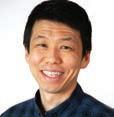
Assistant Professor, Social
Zhiyong Lin, Ph.D.
Assistant Professor, Sociology
Stephen Pan, Ph.D.
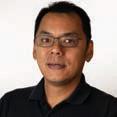
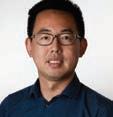
Assistant Professor, Public Health
Fernando Riosmena, Ph.D.
Professor, Demography and Sociology Director, Institute for Health Disparities Research

Christina Sue, Ph.D.
Professor, Sociology
Brandon Tregle, Ph.D.
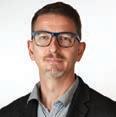
Assistant Professor, Criminology and Criminal Justice
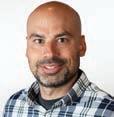
MASTERS 193 UNDERGRADUATE DEGREES 1,525 DOCTORAL 10
SOCIAL WORK 72,225
PUBLIC HEALTH KINESIOLOGY CRIMINOLOGY AND CRIMINAL JUSTICE NUTRITION & DIETETICS PUBLIC ADMINISTRATION PSYCHOLOGY 55,200 36,300 31,356 20,436 3,750 9 * internship hours are calculated based on the most recent data
15,415
ALUMNI 219,276 INTERNSHIP HOURS
STUDENTS ENROLLED
Work
FACULTY HCAP 2022–2023 BY THE NUMBERS
Lynne Cossman Dean of College for Health, Community and Policy Professor, Demography and Sociology
Dean's Note
Welcome to our third edition of Engage, which highlights the people and the events that make HCAP successful in enriching the lives of San Antonians, South Texans, Texans, Americans and even global citizens.
In this issue, you’ll see many stories. Our stories about current students tell you about community engagement via the arts, how we have kinesiology students who are interning for the NFL, and UTSA’s quarterback Frank Harris. We also tell you about alumni who are pursuing careers in health who come from each and every program in HCAP (and there are nine!). You will also read about incredible new partnerships – with the Department of Education and with Judge Nelson Wolff, for example. Other exciting events are happening across the college and I want to bring your attention to a few of them.
I am basking in the glow of another successful Dean’s Community Lecture Series. This time we honored Fernando Guerra who was the longest serving director of MetroHealth. In the spirit of the HCAP Dean’s Community Lecture Series, we partnered with Metro Health and the UT School of Public Health in San Antonio to bring former mayor Henry Cisneros, a former colleague at Metro Health, Theresa De La Haya, and Dr. Guerra’s cousin, Father David Garcia, together to reminiscence about his contributions to San Antonio. Dr. Guerra embodied what HCAP is all about: understanding the root causes of health and wellness and creating a context in which the citizenry can be healthy and happy. This particular Dean’s Community Lecture Series, which we hope to continue each April in Public Health week, is one of many
partnerships that will be emerging with our new school – the University of Texas School of Public Health San Antonio. This School of Public Health is highlighted in these pages and is a unique collaborative effort between UT Health and UTSA in conjunction with our colleagues at MetroHealth.
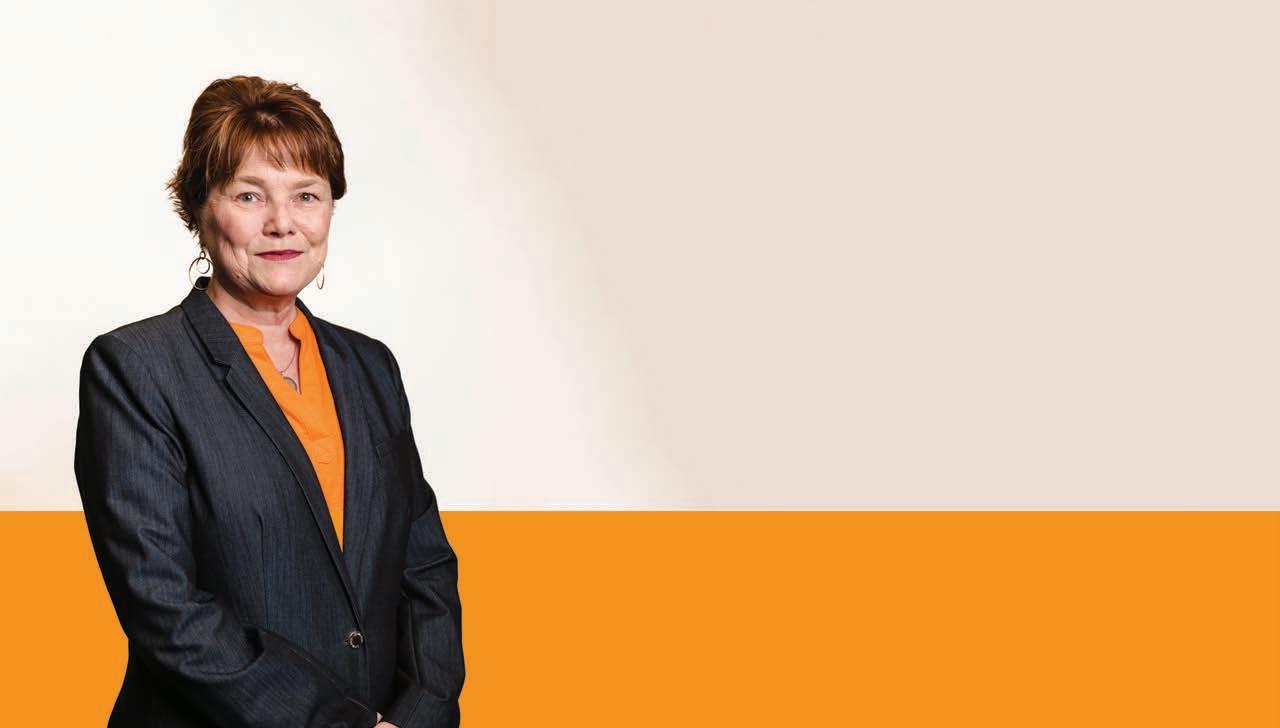
We completed another Giving Day at UTSA and nearly three dozen donors gave almost $10,000 to the college. We appreciate your support of our efforts and give a special “shout out” to Methodist Health Ministries whose own gift represented half of our total! Making a gift is just one way that you can get involved with HCAP. We would love to have our alumni and community members working together with our students. There are so many ways you can get involved. We have an Alumni
Leadership Council you are welcome to join. We have students thirsty for experiential learning opportunities—most typically in the form of internships. We would love to have you in attendance at our Dean’s Community Lecture Series events, which are STRONGER precisely because they bring staff, faculty, students, alumni and community members together to think carefully and discuss thoughtfully the very complicated social problems we all face. I tell our graduates at each commencement that we have trained them to be agents of change—it is on all of our shoulders to practice what we preach and to show them as role models that we are all lifelong learners who are interested in making our communities better and stronger together.
2 ENGAGE |
Dean’s Advisory Council
The Council’s mission is to drive strategic direction while promoting the college’s mission to community partners and stakeholders. The vision of the Council is to offer support and collaborate through local, regional and nationally recognized experts across the community, health and policy sectors.
Ian M. Thompson, Jr., MD
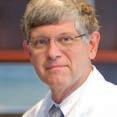
President, Santa Rose Foundation and the Children’s Hospital of San Antonio Foundation
Jaime Wesolowski
President and CEO, Methodist Healthcare Ministries of South Texas
Chiquita A. Collins, Ph.D. Associate Vice President, Inclusive Excellence and Health Equity, UT Health San Antonio
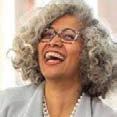

Vice Dean for Inclusion and Diversity, Chief Diversity Officer, Long School of Medicine
Phil Beckett, Ph.D.
CEO, C3 Health Information Exchange

Dr. Ana “Cha” Guzman Consultant, Strategic Partnerships, Inc.
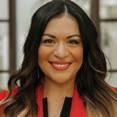

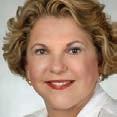
Esteban
Market
William McManus
Chief of Police, City of San Antonio
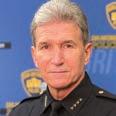
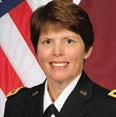
Janie Martinez Gonzalez
President, CEO and Digital Engineer, Webhead
Senator Leticia Van de Putte
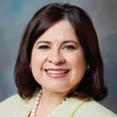
Co-Founder and President, Andrade-Van de Putte Consulting


President and CEO, San Antonio Hispanic Chamber of Commerce
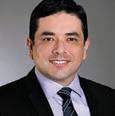
Ted Terrazas
Sr. Vice President of Medical and Business Services, Chenega Corporation

3
Kara Allen Chief Strategic Officer, San Antonio Spurs
Talli Dolge Founder and CEO, A Mindful Workplace
López, MD, MBA, FAAP, FACP
Lead- Healthcare and Life Sciences, Americus and Google Cloud Founder, Hopscotch Health
Jimmie O. Keenan, MSN, RN, FACHE, FAAN, Major General (Ret) US Army Sr. Vice President, Enterprise Clinic Operations, WellMed Medical Management Inc.
Marina Gonzales, JD
| ENGAGE
Remembering Steven Murdock
Steven Murdock, former State Demographer and UTSA faculty member, died on April 7, 2023. He was 75.
Murdock joined UTSA faculty in 2004 as the Lutcher Brown Distinguished Chair in Management Science and Statistics. As part of his appointment, UTSA created the Institute for Demographic and Socioeconomic Research (IDSER). Murdock served as its inaugural director.

As the inaugural State Demographer from 2001 to 2007, Murdock headed the Texas State Data Center, a network of 45 university, state, regional and municipal agencies that provide access to demographic information about the socioeconomic characteristics of Texas. Credited as the originator of the position, Murdock presented more than 50 times each year to groups such as Texas legislators, superintendents of education and other academics on the growth and changing distributions of Texas' population.
He was nominated by President George W. Bush to serve as director of the Census Bureau in 2007, and held the position from January 2008 to January 2009.
“Dr. Murdock’s vision created a unique doctoral program that remains the only applied demography Ph.D. program in the country,” said Professor of Demography Johnelle Sparks. “Steve was committed to making the next generation of demographers look more like the population of the state of Texas. He created a program that has served many first-generation and racial/ethnic minority students that are contributing critical perspectives to addressing population-based problems. The Department of Demography owes its success to his vision.”
A nationally respected demographer, Murdock was named one of the 50 most influential Texans by Texas Business in 1997. He was a member of numerous national organizations and honor societies, including Phi Beta Kappa, the Population Association of America, the Rural Sociological Society, the Southern Regional
Demographic Association, the Southwestern Sociological Society and the Southern Sociological Society.
“Steve was a bit of a maverick with a strong will, and he did not mince words,” said Professor of Demography and current Texas State Demographer Lloyd Potter. “His style was to speak clearly and to engage with facts. He worked effectively with politicians regardless of party, providing them with data and with simple and straight forward interpretations to facilitate data driven policy. His contributions to a better Texas and to the field of applied demography are difficult to quantify, but there are few who have done more.”
In addition to his position at UTSA, he has held named professorships in sociology at Texas A&M University and Rice University.
“Steve had a long, distinguished career in demography, rural sociology and impact analysis," said Michael Cline '10, state demographer of North Carolina and alumnus of the Ph.D. program at UTSA. "Most knew him as the first State Demographer of Texas, the 'Jack Webb of statistics,' who used presentations filled with numbers to get Texas to realize that Texas was changing and that closing educational attainment gaps would ensure a better future for all."
Murdock earned his doctorate in demography and sociology from the University of Kentucky. He authored 11 books and more than 150 articles and technical reports on the implications of current and future demographic and socioeconomic change.
Murdock was born in Fergus Falls, Minnesota, on June 2, 1948. He is survived by his spouse of 27 years, Mary Zey of Austin; stepson, James Collins Ferrell of Houston; grandson, George Collins Ferrell; sister and brother-in-law, Joanne and Roger Lonbaken of Pierre, South Dakota; and brother and sister-in-law, Lee and June Murdock of Grand Forks, North Dakota.
–Amanda Cerreto
In 2019, Murdock and his wife, Dr. Mary Zey, established a fellowship for demography students at UTSA.
The Dr. Steven Murdock and Dr. Mary Zey Demography Fellowship at UTSA has helped four students attain their higher education goals – and with your help, we can increase that number.
“[My financial burden is] lightened… which allows me to focus more on the most important aspect of school: learning,” said Christina QuintanillaMunoz, 2022 recipient. “Your generosity inspires me to continue serving my community in hopes that I may inspire future students to also achieve their academic goals.”
“With the funds awarded from this scholarship, I will be able to dedicate myself more fully to my schooling and career aspirations,” said Andrew McCracken, 2020 recipient. “In doing so, I hope to give my children a role model that will inspire them to give back to the community as well.”
To give, visit online at giving.utsa.edu/makeagift. Choose “Other” in the drop-down menu and enter “In memory of Steven Murdock.”
Or, mail your gift, payable to UTSA, to UTSA Gift Services, One UTSA Circle, San Antonio, Texas 78249. On the memo line, write “In memory of Steven Murdock.” Please call 210-458-4130 with questions.

4 ENGAGE |
Maintaining student enrollment and success post-COVID:
HCAP leads the way
Alberto Cordova, associate dean for undergraduate student success in HCAP, was awarded a five-year, $3 million grant from the U.S. Department of Education to improve student success rates at UTSA.
The Title V funding, La Reforma: FRoM COVID-19 to Graduation, will enable HCAP to provide students with financial fluency, improved mental health and well-being, and will increase persistence and retention rates, particularly among UTSA’s Hispanic population. “Student success and well-being go hand-inhand,” Tammy Wyatt, vice provost for student success, said. “At UTSA, we have adopted a comprehensive and holistic approach to supporting our Roadrunner community to help students build a foundation for healthy living and academic success. I am excited about the additional opportunities this funding will allow us to explore.”
When it entered the post-pandemic phase of education, UTSA identified three key barriers to student success: financial management, mental health and academic performance. Students — particularly first-generation students — indicated that lack of experience and resources left them unprepared to balance family, work and school demands.

Moreover, many students experienced exacerbated mental health conditions, including symptoms caused by stress from financial difficulties and family dynamics, hunger and other acute crises prompting increased feelings of hopelessness during the pandemic.
Through this grant, HCAP and the university plan to supplement and strengthen services specifically for at-risk students by implementing three programs designed to address each key barrier.
“The funding from the U.S. Department of Education will help HCAP launch many programs to improve students’ experiences while at UTSA and their prospects of finishing the degree program, with the necessary skills to succeed in their careers,” said Lynne Cossman,
dean of HCAP. “We are very proud of Dr. Cordova for landing this funding and look forward to scaling HCAP’s programming to benefit all UTSA students by the end of the grant’s funding period.”
To address students’ financial management skills, HCAP will build and offer a series of financial fluency sessions that progressively build on previous content, so that students can move from financial literacy to fluency. The La Reforma Grant will partner with the Office of Financial Success, local financial institutions and other individuals with subject matter expertise to provide the best possible content for students. Workshops will focus on relevant student needs such as budgeting, student loan repayment, building credit, and more.
As part of this series of courses, the college will identify financial ambassadors: part-time wage earners with the responsibility of reaching out to peers and connecting them with relevant services. For example, ambassadors may be placed at the UTSA's Whataburger Resource Room, a key touchpoint for students in need of support.
In addition to the financial fluency sessions, HCAP plans to bolster UTSA’s mental health efforts by bringing additional well-being and mental health training to students. Many students are unaware of the many mental health and wellness resources available at UTSA. The grant will bolster the opportunities for HCAP students seeking help, as well as instill more confidence when calling upon those services. Offices such as Wellbeing 360 offer a 24/7 hotline through My Student Support Portal and peer counselors to reach out to for assistance. By raising the frequency the students hear of these resources, the more likely they will be comfortable to use them, and then share with others their positive experience.
The final aspect of the grant funding will address academic support to increase retention. The college plans to re-engage “stop-out” students – students who temporarily withdraw from school – caused by the pandemic by increasing support via peer mentors and tutors, well-being certification counseling and data tracking.
“This grant will allow us to draw on our experiences and expertise to further serve our students,” Cordova said. “This grant will continue the collaborative work we invest in our students to help them thrive.”
Since the grant was awarded, the team has hired Lisa Vigil as research program manager. Vigil came to HCAP from the UTSA Career Center and is well-versed in student needs.
“There is so much possibility in this position,” Vigil said. “HCAP students are really engaged and want to improve their communities.”
Vigil was part of the Quality Enhancement Plan (QEP) through Career Engaged Learning previously, and intends to use the knowledge gained in this next role. Through an increase of availability and accessibility of experiential learning opportunities for students, Vigil hopes to fulfill the three foci of the grant: financial readiness, wellbeing, and career readiness.
While data on the grant’s success won’t be immediately available, early indicators of success are present through an increase in applications for the Ambassador positions for summer and fall.
“Thanks to Dr. Cordova and his vision, we will be able to scale our group and reach our HCAP students at large,” said Vigil. “We have highly capable, motivated students who just need an extra push towards their goals. I’m overjoyed to be on board for this adventure.”
–Amanda Cerreto
5 | ENGAGE
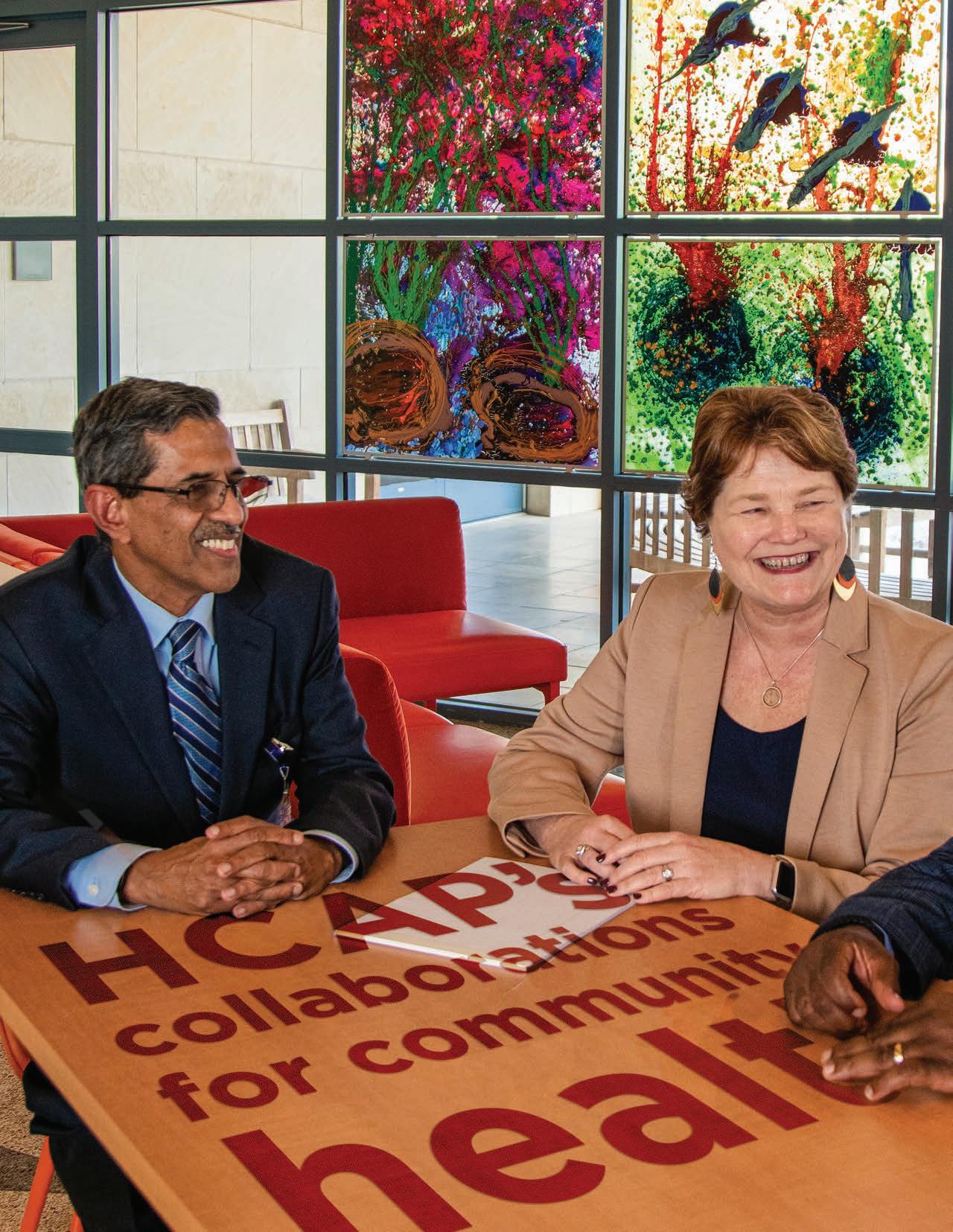
ENGAGE | 6
Harnessing the power of community collaborations amplifies HCAP’s ability to foster a healthier San Antonio, continue to address health disparities and achieve a healthcare system that is truly responsive to the needs of the people it serves.
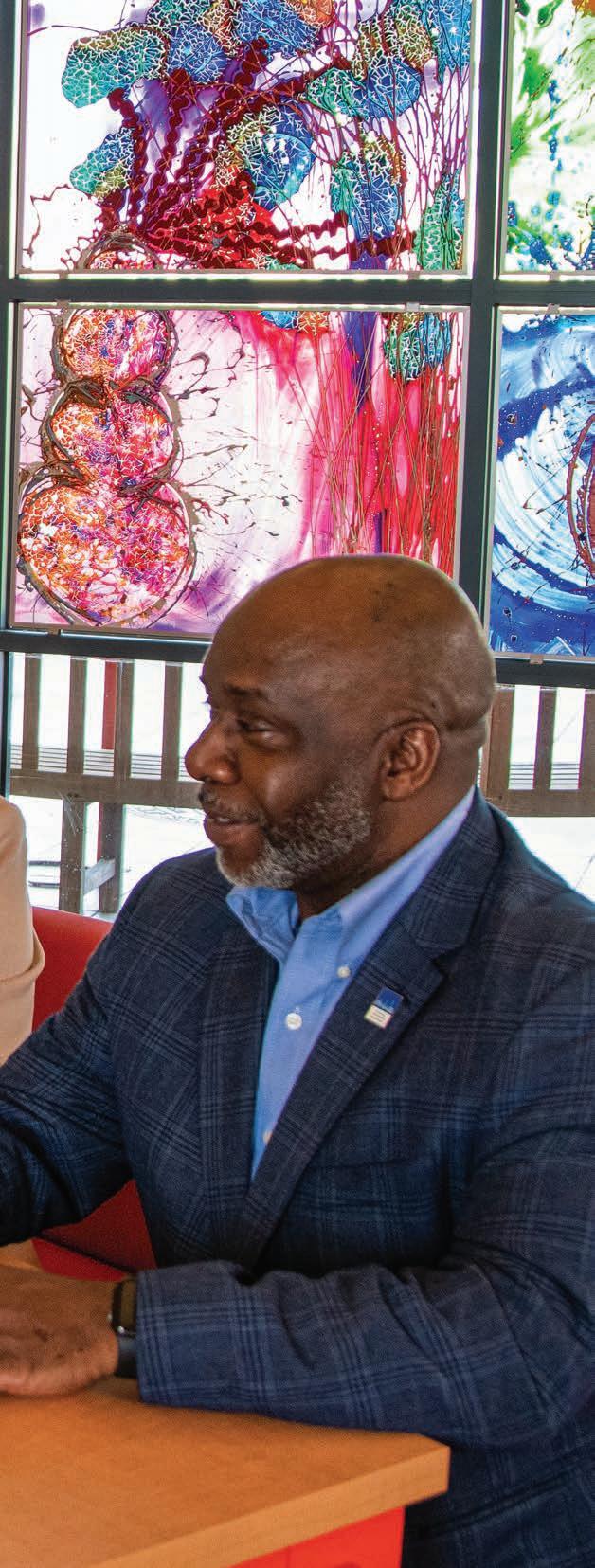
“Partnering is key to HCAP’s mission as we are focused on improving the health and well-being of those around us,” said Lynne Cossman, the inaugural dean of the College for Health, Community and Policy. “This cannot be accomplished in an academic vacuum but requires us to work with community agencies, UTHealth as the local medical school, and the San Antonio Metropolitan Health District. We have spent the first several years of the college’s existence building these relationships.”
One of HCAP’s most exciting partnerships yet came with the November 2021 University of Texas System Board of Regents approval of plans for a new collaboration between UTSA and UT Health Science Center San Antonio. The project, the UT School of Public Health San Antonio (UT SPH), will support the UT System in San Antonio as a public health leader and community partner in South Texas.
San Antonio is a majority-minority city with a large and growing Hispanic population, which reflects the demographic future of the nation. Until now, San Antonio was the largest city in the U.S. without a school of public health.
UT SPH will build upon HCAP’s and UT Health San Antonio’s combined expertise in such areas as data science, epidemiology and biostatistics, behavioral science, finance and business administration and implementation science. The venture will prioritize the health care needs of a 38-county region that includes several urban markets and majority-minority cities, and a number of communities that the U.S. Health and Resources Administration has identified as underserved rural areas.
“UTSA and UT Health San Antonio are urban serving universities that are deeply committed to meeting the unique health needs of South Texas’ diverse population,” said UTSA President Taylor Eighmy. “This new School of Public Health will be a gamechanger in preparing our region’s next generation of public health leaders and advancing transdisciplinary research solutions that create healthier communities.”
Public health faculty at UT Health Science Center and at UTSA have been working together to design the Master of Public Health (MPH) curriculum and will continue to collaborate to build two doctoral programs. While much of the infrastructure will be located on the UT Health Science Center campus, students will take classes from faculty on both campuses. The continued collaborations will intentionally bring together faculty who will have combined research interests as well, increasing the potential for funded work to better understand public health in San Antonio—and to develop solutions.
When the College for Health, Community and Policy was formed in 2020—during the heart of the COVID-19 Pandemic—it crafted its mission to develop solutions that affect real change for complex social issues in San Antonio, Texas and beyond.
7 | ENGAGE
“Our collaborative UT School of Public Health will leverage cooperation, alliances and teamwork across multiple stakeholders and regional institutions to impact public health in San Antonio, Bexar County and South Texas over the coming decades,” said Vasan Ramachandran, M.D., inaugural dean of UT SPH. “We anticipate that the UT School of Public Health will emerge as a national leader that addresses major current and future public health challenges, partnering with and empowering our communities with the overarching goal of reaching and sustaining health equity.”
UT SPH will begin accepting students in 2024, offering advanced graduate degrees. The location on the Greehey Campus of UT Health San Antonio will provide optimal access to the region’s major medical and academic health facilities. Through its coursework, it will provide a unique public health education by integrating advanced health research, collaborating on new academic programs to serve a diverse population and building public health leaders who understand and are dedicated to `finding positive interventions to mitigate our greatest public health challenges. The first doctoral students will be admitted in 2026.
HCAP and UTSA have also expanded their partnership with Metro Health, a City of San Antonio agency that provides public health services in the city and unincorporated areas of Bexar County. Claude A. Jacob, Metro Health Director, has led the department since July 2021 and is responsible for setting public health priorities and guiding the overall activities of Metro Health in consultation with city leadership and community stakeholders.
Metro Health is a nationally accredited agency as recognized by the Public Health Accreditation Board and has received local, regional and national acclaim for its model practices and innovative policies. The agency provides an array of services in foundational areas of public health, including environmental monitoring, health code enforcement, chronic disease prevention, clinical and laboratory services, immunizations, maternal care, communicable disease control, health education and community outreach and emergency preparedness.
In response to lessons learned from the pandemic, Metro Health launched SA Forward in April 2022. SA Forward is a multi-year strategic plan to protect and strengthen public health capabilities while addressing conditions that impact the quality of life of area residents. In November 2022, Metro Health also received funding through the Centers for Disease Control and Prevention’s (CDC) Strengthening U.S. Public Health Infrastructure, Workforce and Data Systems grant, one of 100 grantees from across the country.
“Improving our public health system heavily relies on enhancing crosssector partnerships on the ground,” said Jacob. “Through SA Forward, our current collaboration with UT Health San Antonio and UTSA, coupled

with this one-of-a-kind grant from federal funders, allows Metro Health to prepare our workforce and operate as a health department for the twentyfirst century. I am thankful to our dedicated staff, city leadership, and steadfast partners who support us as we address the conditions for all those who live, learn, work, play or pray in this local community.”
Through the years, Metro Health has partnered with UTSA in a variety of ways, from sponsoring interns and presenting in career fairs to partnering on grants and research projects.
HCAP also has a long history of collaboration with Metro Health in research. HCAP researchers have partnered with Metro Health to acquire funding for research projects from agencies such as the CDC, Substance Abuse and Mental Health Services Administration and most recently the Office of Minority Health. These projects have included studies on sodium reduction initiatives, sexual health education, community health and health equity outreach and COVID-19 and health literacy initiatives.
“The partnerships between HCAP and Metro Health have generated research publications and grant dollars while bringing valuable resources to San Antonio to improve health equity,” said Erica Sosa, associate dean for research success and professor of public health. “This partnership is a great example of how applied research can improve lives and extend research capacity locally. With the new UT School of Public Health, we are excited about the increased opportunities and capacity for innovative research that improves health of all communities.”
Most recently, HCAP and the collaborative UT School of Public Health San Antonio joined together with Metro Health for an installment of the HCAP Dean’s Community Lecture Series to celebrate the life and career of Dr. Fernando Guerra, longtime director of Metro Health. Panelists Henry Cisneros, former U.S. Secretary of Housing and Urban Development, Theresa De La Haya, former senior vice president of community health/clinical preventive programs and Reverend David Garcia, retired priest, gathered together to discuss Dr. Guerra’s legacy and the future of public health in San Antonio. Moderated by Dr. Ramachandran, the panel emphasized how much groundwork Guerra laid so that we were better prepared than many communities entering the COVID-19 pandemic.
As the city moves forward from the COVID-19 pandemic, and the need for qualified health professionals both inside and outside of medical settings continues to increase, these partnerships are more critical than ever. By continuing to foster these partnerships, city residents will benefit from comprehensive, patient-centered care provided by a workforce familiar with the challenges and opportunities unique to San Antonio.
–Amanda Cerreto
ENGAGE | 8
Beyond the battlefield
unravels complexities of trauma and resilience in veterans
From our earliest history of war to the current conflicts in Iraq and Afghanistan and beyond, veterans have endured and witnessed significant trauma. These traumatic experiences have significant impacts on the mental and physical health of our veterans and their families – and the population as a whole.
Research on trauma among veterans has become increasingly important in the last several decades. Not only has this research helped to understand the effects of trauma on veterans,

but it has also led to the development of effective treatments, informed policy decisions and improved quality of care for veterans and their family members.
A leader at the forefront of this research is Sandra B. Morissette, professor and chair of the Department of Psychology in HCAP.
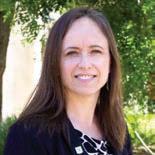
Morissette has dedicated her career to researching and understanding trauma psychology, particularly in the context of veteran support. Her research has focused on understanding factors that influence risk, resilience and functional recovery following warzone deployments. She has conducted important research related to trauma, anxiety
disorders and other commonly co-occurring conditions. She has received funding from U.S. Department of Veterans Affairs (VA), the Department of Defense and the National Institutes of Health, and has published more than 100 scientific articles.
During nearly two decades working for the VA, Morissette developed and directed the first cognitive-behavioral anxiety disorders clinic at VA Boston Healthcare System (VABHS), established a new primary care behavioral health program at VABHS, and contributed to the development of a congressionally-mandated research center for returning post-9/11 veterans in Waco, Texas.
Sandra B. Morissette
9 | ENGAGE
HCAP researcher
“Notably, Texas has a vast shortage of clinical psychologists, and Waco is an area of particularly high need, neighboring Fort Hood, the thirdlargest military base in the world,” Morissette explained. In Waco, among other accomplishments, she and her collaborators established and led a 10-year, VA-funded longitudinal program of research called Project SERVE (Study Evaluating Returning Veterans’ Experiences).
Project SERVE is a network of studies designed to independently and collectively contribute to a better understanding of risk, resilience and functional recovery processes in post-9/11 veterans and their families following warzone deployments. Although Morissette left the VA in 2015, she continues to actively collaborate and lead projects related to this research at UTSA.
“I couldn’t have accomplished what I have without an outstanding team of SERVE investigators from around the country,” Morissette said.
“We are particularly interested in understanding PTSD risk and resilience within the larger context of cooccurring conditions like depression, alcohol/ substance use disorders, TBI, pain, sleep, suicide and non-suicidal self-injury. Our overarching aim is to develop translational clinical treatment programs using empirically-supported predictors of risk and resilience for PTSD, co-occurring conditions and functional recovery.”
As one example, several papers from this line of research have converged around the importance of a construct called psychological inflexibility, which refers to a tendency to avoid unwanted thoughts and emotions with a degree of rigidity that interferes with acting upon one’s life values. Psychological inflexibility is associated with worse PTSD symptoms, disability, quality of life and suicidal ideation in veterans. Reciprocally, psychological flexibility is predictive of
resilience and PTSD recovery. Collectively, these findings point to the importance of investigating whether intervening at the level of psychological inflexibility could move veterans with PTSD and other co-occurring conditions, such as depression, pain and TBI, to improved functional trajectories and recovery.
In 2021, Morissette was elected as fellow to the American Psychological Association (APA), Division 56 (Trauma Psychology). This national recognition is awarded on the basis of outstanding contributions to the field of psychology that have had a national impact.
“Lethal means safety is particularly important because it has been widely established that access to lethal means increases risk for violence, not only for the veteran, but all members of the household,” Morissette said.
“Dr. Morissette’s work on veterans’ psychological trauma is critical, and it’s especially relevant to our San Antonio community known as Military City, USA,” said Lynne Cossman, dean of the college. “While we train our military members to be resilient, the trauma they experience on our behalf is substantial. It is imperative to ease that burden and Dr. Morissette is leading the charge.”
More recently, Morissette served a guest editor with Jack Tsai, dean of the UT School of Public Health, for a special section in Psychological Trauma: Theory, Research, Practice, and Policy. In the introduction, Morissette focused on building human flourishing and resilience, noting that these areas in particular have had less research and development than post-traumatic stress recovery areas.
Human flourishing and resilience may be particularly important for suicide prevention. Since her election as fellow for APA, Morissette has also published several new articles with her collaborators in various academic journals on topics ranging from firearms safety among veterans to veterans’ experiences with suicide ideation, non-suicidal self-injury and social support.
Morissette received her doctoral degree in clinical psychology in 2001 from Boston University. Her work has contributed in part to a shift in the field to considering complex co-occurring conditions, particularly anxiety/ traumatic stress disorders and addictive behaviors. Moreover, her research has contributed to increased attention on understanding longterm functional recovery processes among returning veterans.
“This work is far from done,” Morissette said. “Although most veterans are resilient and will never develop mental health conditions, risk for PTSD is elevated in the context of their higher trauma exposure. We must continue to build a workforce of researchers and clinicians to more fully understand and treat the complexities of PTSD and co-occurring conditions, and promote functional recovery.”
Cerreto
–Amanda
ENGAGE | 10
"Dr. Morissette’s work on veterans’ psychological trauma is critical, and it’s especially relevant to our San Antonio community known as Military City, USA."
Revolutionizing health and community education
Since the pandemic, there has been a surge in demand for specialized health education programs that cater to diverse needs and interests. The changing landscape of healthcare means that consumers and companies rely on innovative academic programs that focus on holistic wellness, alternative therapies and integrative medicine.
HCAP has developed four new programs to address the growing need for an educated workforce—with more on the way.
Bachelor of Science in Health, Aging and Society
Launched in the fall of 2022, this first-of-its-kind program is housed under HCAP’s Department of Sociology and is offered as a major or minor. Students learn critical skills to begin a career focused on managing and coordinating hospitals, nursing homes and other health care facilities. They will be well-positioned to research, design and share needed services with communities.
Undergraduate student Karime Hinojosa has added Health, Aging and Society as a minor to her studies in sociology. “Health, Aging and Society has courses that discuss important topics in all aspects of life, such as Gerontology, Health Disparities and Health in Adolescence and the Transition to Adulthood,” she said. “In just the past four months, I have been able to further my knowledge of all components of health.”
“The Health, Aging and Society program follows a recent international trend to integrate sociological perspectives into the study of health, health care, and aging,” said Terrence Hill, a professor in the Department of Sociology and founding director of the program. “Our new program is perfect for students who seek a balance between academic and applied approaches to health and aging.”
The need for leaders in the medical, health, social and community services has been increasing for several years, explained Hill. Meanwhile, the infectious disease pandemic only increased demands on health care systems and revealed how poorly equipped those systems are.
“We are seeing adjustments in the health care labor force, with certain segments resigning in higher rates,” said Hill, adding that many of those who are leaving are disillusioned by their experiences within these systems.
11 | ENGAGE
Students in the program will study four core areas:
• Sociological perspectives on health and aging: explores health, health care and aging as social and institutional problems
• Health professions, administration and management: to learn skills related to health care administration and systems management
• Data analytics : teaches students to analyze and read data in research studies

• Interdisciplinary perspectives on health and aging: exposes students to different ways of thinking about health, health care and aging
This unique blend of theoretical and professional training is designed to prepare students for the job market or for further graduate study in the areas of health and aging.
“This new program connects the classroom to careers for students with interests in social disparities that impact health and well-being across the life course, and who desire marketable skills to be able to make a difference in applied health care settings upon graduation,” said professor and chair of the Department of Sociology.
“Health, Aging and Society is the first of many new programs to be launched within the college,” said Dean Cossman. “We are creating interdisciplinary majors that provide students the skills necessary for growing areas of the workforce. With the aging of American society and the growing health care needs of the elderly, this community-engaged, interdisciplinary major is sure to attract diverse cohorts of majors and minors.”
Master of Science in Health, Community and Policy
The health of citizens is significantly influenced by their communities and the policies that govern them. The Master of Science in Health, Community and Policy addresses the need to examine the intersection of these three disciplines to prepare a workforce ready to achieve optimal health outcomes for all.
The Health, Community and Policy graduate program provides a strong focus on training individuals to move into community health, population health and health policy-related fields. Program graduates will enter a job market with opportunities in areas with growing demand, up to 31% anticipated job growth in the next 10 years.
Felisha Rios, who recently completed her undergraduate degree in Public Health, enrolled in the MS program because she felt the curriculum would help her gain experience and skills necessary for her future health career –and acceptance into medical school.
“This program gives ‘Runners to opportunity to pursue a difference path that will allow them to expand their knowledge,” she said. “In addition, they will receive guidance from experienced advisors and professors.”
“This is a unique program because it draws on multiple disciplines, including public health, demography, sociology and public administration,” said Jeffrey Howard, associate professor of public health. “It prepares graduates for careers in many different health-related settings, all within a large, diverse metropolitan environment.”
Students will examine the social determinants of health, such as poverty and education, and how they impact health outcomes in different communities. They will also explore how policy decisions can affect access to healthcare, the quality of care and overall health outcomes.
This unique interdisciplinary experience offers four specializations to choose from:
• Health Promotion: This pathway is focused on community-based health promotion efforts and trains students to develop health promotion programs/interventions, with an emphasis on nutrition and physical activity, program implementation and evaluation. This
how to work with large, electronic health databases, including health surveys and Census and medical claims records, and how to analyze and transform this data into useful insights to inform health policy, intervention and decision-making.
“The College for Health, Community and Policy was designed to build programs just like the new interdisciplinary master’s degree,” said Cossman. “We are training a 21st century workforce who will look at health and health disparities from many perspectives rather than a singular perspective. That transdisciplinary lens always makes both the understanding of problems and development of solutions more creative.”
Bachelor of Science in Health and Nutrition
In San Antonio as across the country, families struggle daily with food insecurity and access to healthcare. Communities also struggle with growing and maintaining a sustainable food system, especially in the face of poverty.
ENGAGE | 12
The Bachelor of Science in Health and Nutrition, launching in fall 2023, seeks to train a workforce prepared to tackle these problems.
“Nutrition is the key factor to preventing many chronic illnesses,” said Liset Leal Vasquez, director of the program. “We're trying to grow a local capacity of nutrition health professionals to close the gaps in the workforce and improve health.” These gaps are particularly prevalent in rural communities.
What makes this degree program so unique is the dual-track offering: students can choose a specialization in Maternal Child Health and Nutrition or Sustainable Nutrition and Food Systems.
“These tracks will give students those specific skills to work with organizations like the Special Supplemental Nutrition Program for Women, Infants and Children (WIC) program, the Metropolitan Health District and more,” Vasquez said. “By joining forces, we can turn the tide and create sustainable food and nutrition practices while also addressing major gaps in healthcare.”
This degree is particularly important for students who wish to use the skills learned to improve their communities, because grand scale change often starts at the local level. Students in the program will be able to leverage
Bachelor of Social Work
UTSA’s Master of Social Work (MSW) program is ranked in the top 100 social work programs in the nation by US News and World Report. To create more building blocks to that success, HCAP has developed the Bachelor of Social Work (BSW) program.
Built as a companion and partner program to the graduate degree, the BSW provides students with skills and knowledge to effectively address challenges at the individual, family, community and policy levels, opening doors to a career focused on making a positive influence on the lives of those who are vulnerable or marginalized.
“The unique preparation of BSW students makes them extremely versatile, working in schools, non-profits, hospitals, child welfare, policy and advocacy settings, case management and crisis response and much more,” said Derek Plantenga, social work professor of practice. “We are excited to bring this program to UTSA!”
There is a significant need for social workers in San Antonio. As the seventh-largest city in the United States, it faces problems like poverty, intimate partner violence, homelessness, mental health issues and substance abuse. A workforce trained in addressing these problems at individual, local and global levels will begin to solve these problems.
This unique program prepares and develops generalist social workers for culturally competent, transformative practice that promotes equity, social justice and well-being within a local-global context. It also provides a natural and excellent stepping stone into the MSW program, allowing students to potentially qualify for an abbreviated version of the MSW degree – saving students a significant amount of time and money.
their skills to teach families how to use the land to create local gardens and how to be sustainable in their own homes, as well as provide an emphasis on food safety.
As part of the degree program, students will also take cooking classes where they will learn the basics of cooking, food safety and ways to address food insecurity. This is particularly important in San Antonio, where roughly 28% of residents live in food deserts, according to SA Climate Ready.
Graduates of the program will be prepared to earn several certificates depending on the track they choose, including a lactation consultant certification and a dietary manager certification. They will be wellprepared to enter fields in public health, government nutrition programs, foodservice management and food agriculture.
“We are excited about the new nutrition and health major, which will open up the discipline to more students than we can currently handle,” said Lynne Cossman, dean of the college. “With diabetes being a major cause of morbidity and mortality in San Antonio and South Texas, this is a critical major for our emerging workforce.”
Students begin the program with a social work core, including courses across all disciplines for a well-rounded approach to theory and practice. Classes include Diversity and Social Justice, Policy, Human Behavior, Social Work Practice Skills and more. The program culminates with a 450-hour practicum in a community agency, giving students the handson skills that are often learned on the job – providing them with an edge for employment upon graduation. Graduates are entering a workforce where social workers are in demand, with their job outlook growing faster than average.
“We have a long-standing master’s in social work, but no means to train social workers at the undergraduate level,” said Cossman. “The addition of this major will let UTSA students choose their career path earlier than the current MSW. Importantly, this is the only Bachelor of Social Work in the greater San Antonio area offered in-person at a public institution.”
Social workers are essential to promoting social justice and equity, as well as improving the overall well-being of their communities. This degree program seeks to give more students the skills needed to begin tackling the largest problems at the local level.
Cerreto
–Amanda
13 | ENGAGE
"By joining forces, we can turn the tide and create sustainable food and nutrition practices while also addressing major gaps in healthcare."
Judge NelsonWolff brings expertise to UTSA students
Furthering a commitment to public service and engaging students in the ideals of citizen government, former Bexar County Judge Nelson Wolff has partnered with UTSA to bring his 50 years of political involvement to students.
Wolff will offer insight from his service as a state representative, state senator, city councilmember, mayor and county judge through lectures and talks. He will also serve as an advisor to the HCAP Dean’s Community Lecture Series, a thought leadership initiative focused on public policy topics including the economy, transportation, health, affordable housing and other areas.
“It does not surprise me at all that Judge Wolff is keenly interested in education and the preparation of future civic leaders,” said UTSA President Taylor Eighmy. “Nelson’s career as a public servant is legendary, and how he shares his perspectives, insights and wisdom with those interested in public service will be very special. We are delighted about our collaborations with Nelson in this next phase of his remarkable career.”
“After 50 years in public service, I look forward to working with the students, faculty and the leadership at UTSA, sharing what I have learned in my public career and assisting UTSA as it continues to grow as an outstanding Tier One university,” Wolff said.
Wolff made a stop to an MPA class this semester to give advice to students seeking leadership positions locally or regionally. He discussed in detail several public projects he was directly
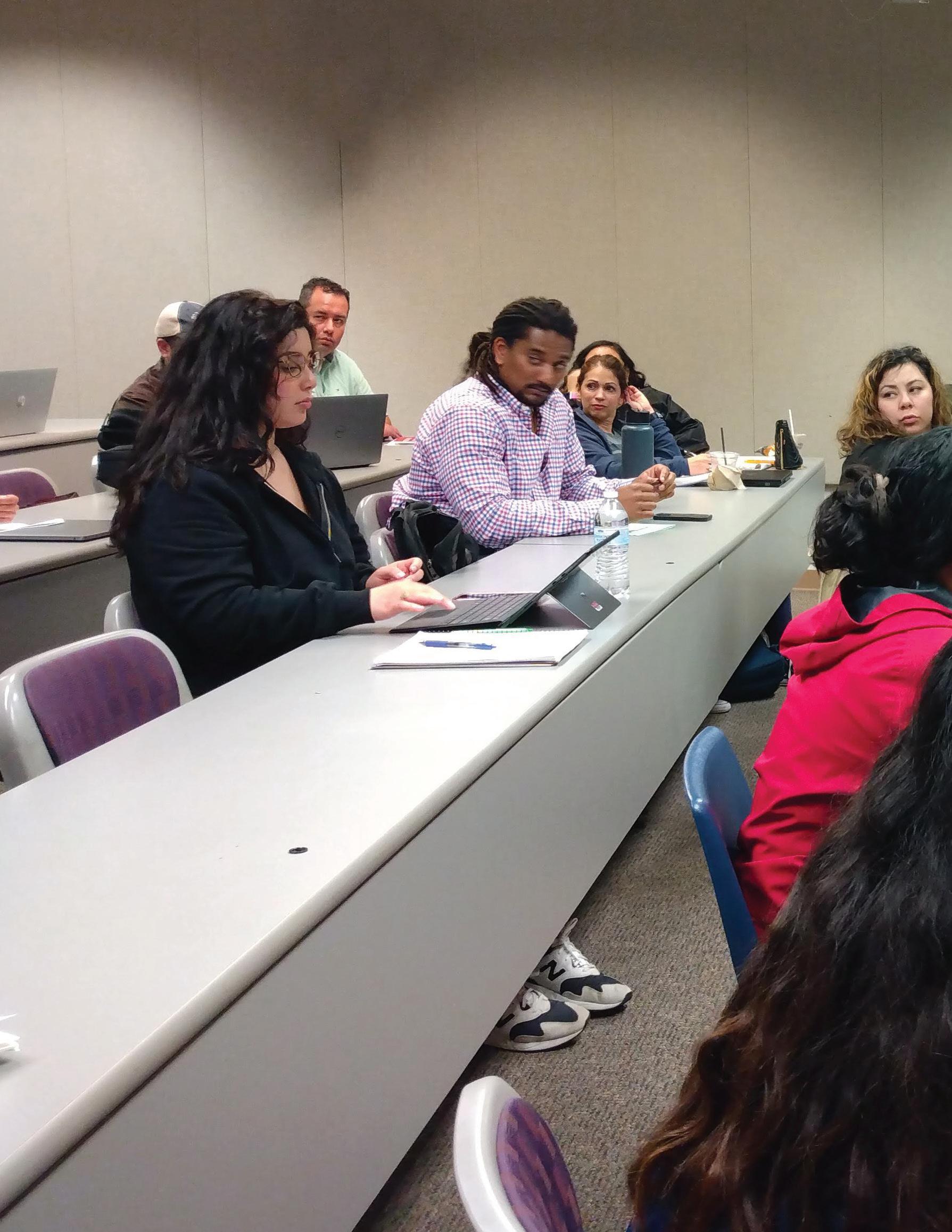
involved with or that he began during his career, and how he rallied support and worked toward a better San Antonio.
Students noted that Judge Wolff was very candid, answering all of their questions honestly, and had a personable approach. “Wolff’s visit was the most enlightening experience this semester for my students and also for me,” said María Verónica Elías, assistant professor. “I was thrilled that he came to my class and sat with us, talked frankly and provided wisdom and political savvy. I consider him an exemplary public servant who always worked hard for the people of San Antonio and the region.”
Wolff also visited a Pretrial/Specialty Courts class in the Department of Criminology and Criminal Justice. “During his tenure as county judge, Judge Wolff saw an emergence of specialty courts,” said Henry Meade, associate professor of practice. Wolff spoke to the reasons why specialty courts have become so popular, and how they are a positive alternative to resolving deep-rooted issues of defendants – especially those who truly want to make changes.
Wolff represented Bexar County in the Texas House of Representatives from 1971 to 1973 and the Texas Senate from 1973 to 1975. He
served as a San Antonio city council member from 1987 to 1991 and then as mayor of San Antonio from 1991 to 1995. In 2001, he was appointed to Bexar County’s highestranking office when then-County Judge Cyndi Taylor Krier resigned to accept an appointment as a regent of The University of Texas System. Wolff was subsequently elected to five full terms as county judge.
Wolff’s role at UTSA will also include collaboration with the UTSA Najim Center for Innovation and Career Advancement on guest speakers and mentors for the university’s student-facing Career-Engaged Learning programs.
“Judge Wolff’s unique combination of experience and knowledge will bring UTSA faculty and students a tremendous resource,” said UTSA Provost and Senior Vice President for Academic Affairs Kimberly Andrews Espy. “His contributions will further advance our Classroom to Career initiative and help prepare our students to serve as the business, community and political leaders of tomorrow.”
– Tricia Silva and Amanda Cerreto
ENGAGE | 14
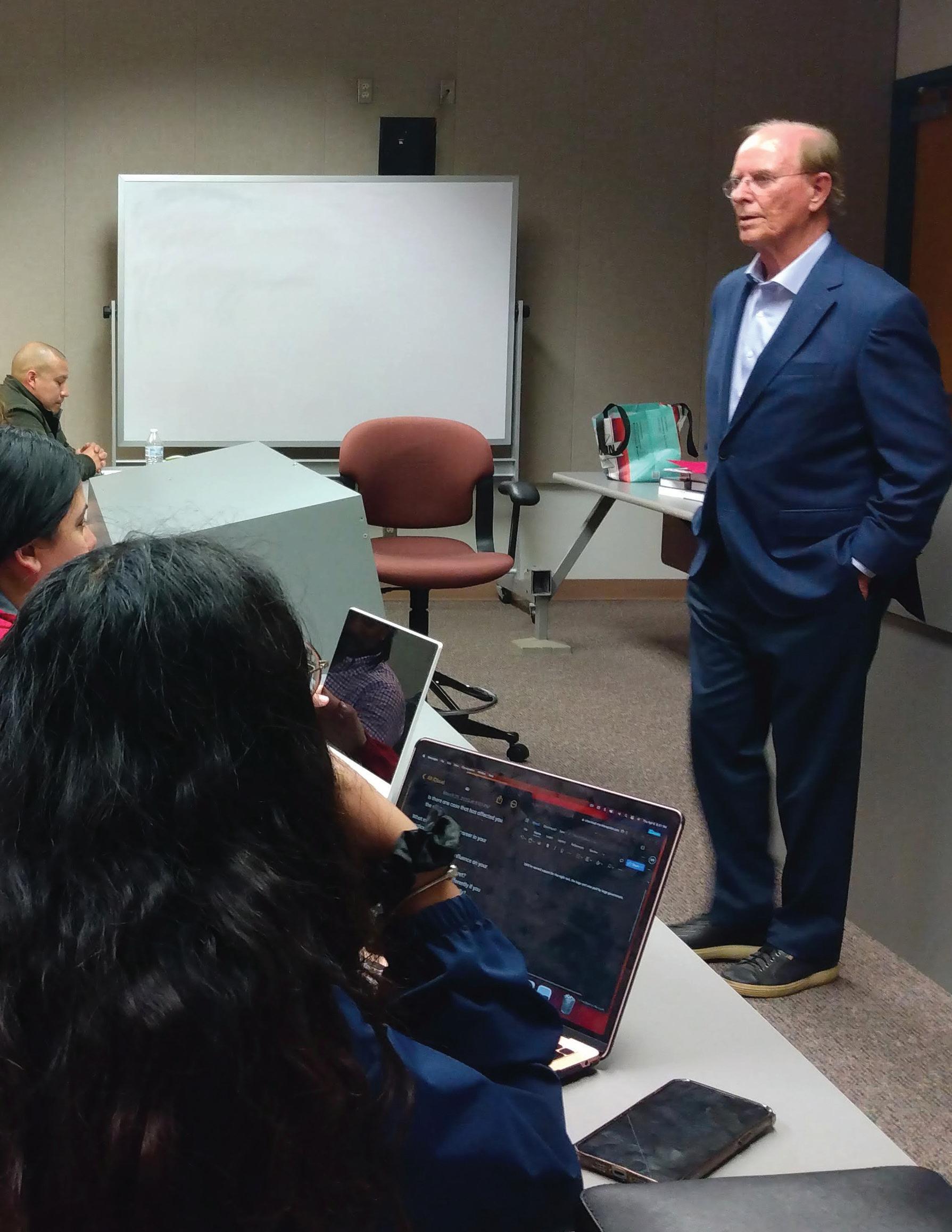
15 | ENGAGE
Improving San Antonio’s Health: a Q&A with Fernando Riosmena, Ph.D.

Demography and sociology professor and Director of the Institute for Health Disparities Research (IHDR) Fernando Riosmena joined UTSA this fall. He comes to HCAP after working for many years at the University of Colorado at Boulder, where he served as the director of the Diversity, Equity and Inclusion Institute of Behavioral Science, associate director of the University of Colorado Population Center, and as an associate professor of geography and sociology and faculty mentor for the Latino Health Certificate in the Colorado School of Public Health.
Fernando Riosmena
Riosmena’s work as a professor and his research for the IHDR focuses on the intersection of immigration and health, a unique crossroads to study at a time when record-setting numbers of migrants are entering the U.S. He chose UTSA because he admires how the university works with the community and produces research that improves people’s lives.
“I hope I can contribute to and honor this tradition with my own work,” Riosmena said. “I also am very excited to be in a Hispanic Serving Institution and in a city with so much history as San Antonio.”
This is your first semester at UTSA. Tell us a little about your background.
I did my doctorate degree in demography at the University of Pennsylvania in beautiful Philadelphia. There, I obtained training to better measure, identify and document patterns of people's actions—like migrating to a new country—and the many important experiences that affect them, such as illnesses. I also gained knowledge and tools to analyze the fundamental causes or roots of these population dynamics and health conditions. My dissertation mainly focused on understanding contemporary patterns of the dynamics of migration from Mexico to the U.S.—and, for many, many people, back to Mexico. My dissertation allowed me to launch a whole research agenda to contribute to a better understanding of international and internal migration patterns focused on Mexican migration.
After my doctorate degree I spent a year at the World Population Program at the International Institute for Applied Systems Analysis (IIASA). Founded during the Cold War Era as a place where "east" and "west" come together to better understand problems of global significance, the institute allowed me to interact with scholars from many parts of the world and to learn more about global issues.
After my stint at IIASA, I spent a year as a postdoctoral scholar at the Center for Demography and Ecology at the University of WisconsinMadison. I started researching health disparities, trying to better understand Hispanic health, particularly immigrants from Mexico. I launched a series of projects to disentangle the ways in which Mexican
immigrants’ health changes through the immigration experience. Since then, I have expanded my research to better understand chronic adult health and aging and race-ethnic disparities, with a focus on the Mexicanorigin population in the U.S.
You’re also the new director of the Institute for Health Disparities Research. What goals do you have for the institute?
My main goal is to make the institute a great intellectual home for folks that research health disparities that allow us to understand how disadvantage "gets under the skin." I am hoping to promote research that better measures the so-called "social determinants of health," more directly and deeply, as well as research that better integrates social and biological mechanisms. I also hope that the IHDR will be a place to do great research not only on race-ethnic differences but also on disparities across other social dimensions like gender, sexual orientation and disability to name a few key ones. I hope the IHDR can also be a place where folks at UTSA, community organizations and government agencies can come together, collaborate and share their research and solutions to issues, such as promoting more equitable access to reproductive health and mitigating the inequitable impacts of infectious and chronic diseases. What kind of research is going on in the institute right now? Can you tell us about a project you’re working on?
A major project going on at the institute is a health promotion project that aims at providing mostly low-income San Antonian middle-schoolers with tools to handle the various pressures and stressors that tend to affect their lives, opportunities and health-related behaviors. The Substance Abuse and Mental Health Services Administration at the Department of Health and Human Services funded the project, which is directed by Drs. Eric Shattuck and Xiaohe Xu.
In addition, an ongoing project of mine in collaboration with folks at six other institutions compares the healthy and unhealthy ways people of Mexican origin in the U.S. age compared to the aging of people in Mexico. The National Institute on Aging is funding this project. I am working on understanding how positive and negative experiences people underwent in childhood and young adulthood negatively impact physical, cognitive and mental health, as well as mortality.
ENGAGE | 16
We are testing whether these experiences affect different types of health and populations in similar ways. We’re also looking at whether the accumulation of people’s experiences compounds in a way that each additional negative event produces a worse impact than the previous one.







We are taking a close look at how the social supports that people have access to and whether living in a cohesive community may help reduce the impacts of negative exposures. I hope the results of this research can guide some ways to promote healthy aging for all adults by facilitating support and cohesion, should these factors prove important to enhance aging.
Your research focuses on the intersection of immigration and health. Why is that an important area?








Understanding the type of health factors immigrants arrive with and how their chronic, cognitive and mental health evolves throughout the immigration experience is important because it provides an assessment of health disparities within different race-ethnic group with recent immigration histories.



















































































































































































































































































































































For example, immigrants in many developed nations tend to be in better health than expected given that many of these folks came from relatively poor or developing countries. They exhibit fairly good health, most notably in terms of mortality, many cardiovascular conditions and some cancers. This is true for Hispanics in the U.S.—particularly immigrants from Mexico—and that is why some people call this phenomenon the “Hispanic Health Paradox.”
My research shows that this “immigrant health advantage” is produced by a combination of factors. First, immigrants arrive with fairly healthy profiles in several indicators associated with better cardiovascular health later in life, particularly smoking behavior. Older immigrants from Mexico living in the U.S. may also exhibit lower mortality in part because a small but nontrivial share of Mexican immigrants eventually migrate back to
Mexico in old age and do so in worse health than those who stay in the U.S. They might be seeking care from family and friends back in Mexico or cheaper healthcare, if they were undocumented.
In some cases, I suspect that folks might want to spend their last few years or months back in their home country. Lastly, Mexican immigrants and, to some extent, Mexican-Americans, exhibit relatively favorable cardiovascular health because of protective factors in their U.S. communities.
This is a line of research that needs more to really understand why and how this is taking place, but the idea is that these folks are somewhat sheltered from stress by living in tight-knit communities and among family. This protection seems to wear off the longer immigrants live in the U.S. For example, my work has shown that Latin American immigrants who live in the U.S. for more than 15 years tend to live four to six years fewer than those who arrived more recently. My project is examining whether immigrants age faster and die sooner because they experience multiple negative experiences throughout their lives, each one leaving a worse effect.
What surprising findings have arisen from your research?




































































































































































































































































































































































































































































































































































































































































































































































































My research on what drives people to migrate suggests that drought-like conditions, which are expected to become more common in many parts of Mexico with climate change, are often associated with lower Mexico-U.S. migration relative to periods with less severe weather or no drought. This is surprising. One would expect that drought and the economic and social dislocations that it produces may push people out of their communities, but this is not the case overall. I am continuing to work on this research to better understand these patterns amid rising climatic variability associated with climate change.

–Brooke Crum
17 | ENGAGE
My main goal is to make the institute a great intellectual home for folks that research health disparities that allow us to understand how disadvantage "gets under the skin."
HCAP students pursuing medicine
With the increasing population in the United States, an ever-aging society and the advancement of medical techniques, there is a high demand for skilled and compassionate healthcare professionals in the workforce.
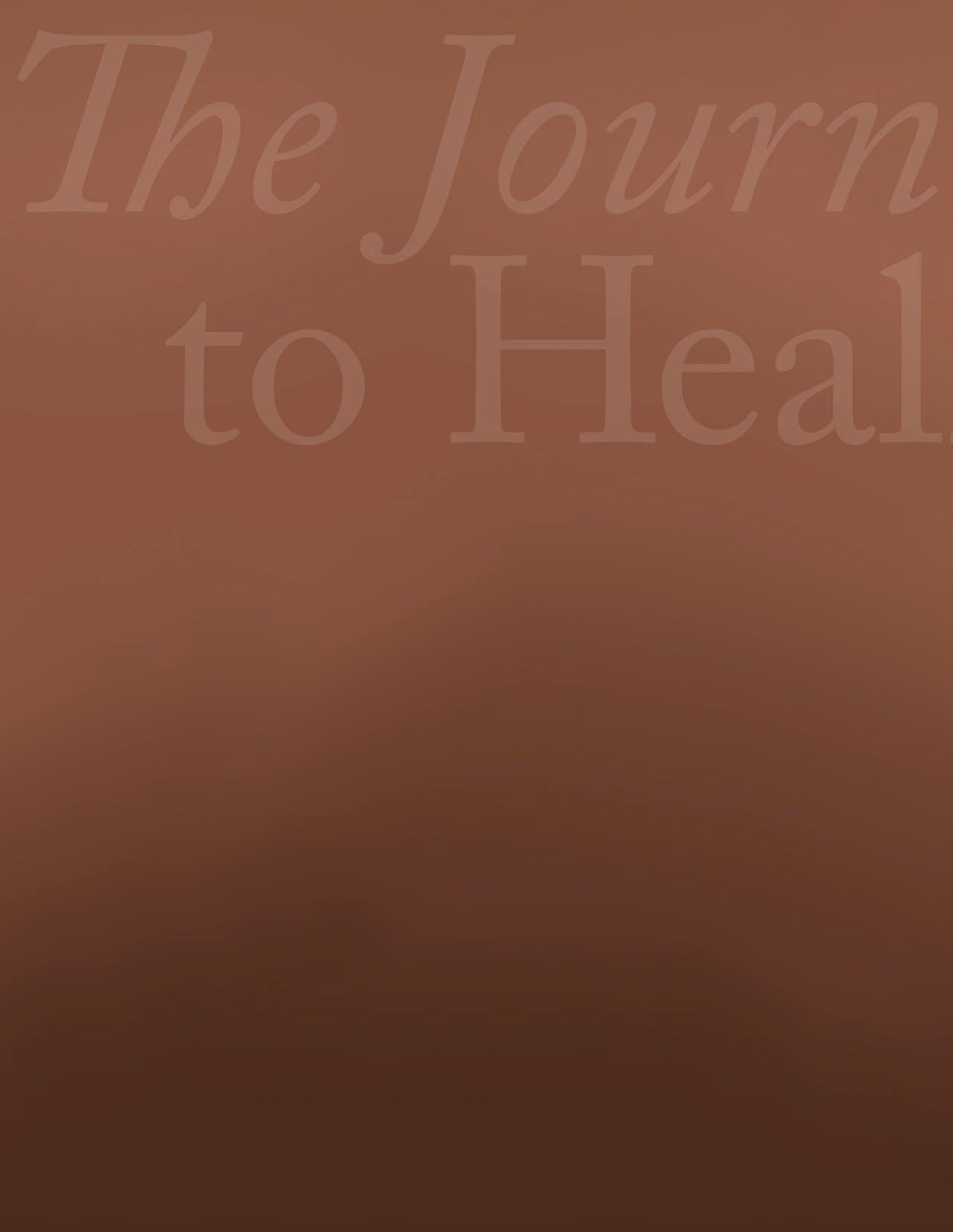
For many students, pursuing a career in medicine is not just a choice, but a calling. Three HCAP students have answered the call and are taking several different paths through the college to position themselves for success post-graduation.
Javien Charles ’25 Epidemiology and Disease Control
As a child, Javien Q. Charles would observe her neighbors and friends struggling with general healthcare issues in the East Houston area. “I grew up in an area where the sense of community was rich, but neither rich in health education nor funds,” Charles said, “and seeing how much worse it was for people without health insurance made me want to make a change.”
She enrolled in public health at UTSA with this goal in mind – to not only practice medicine, but to help the often-underrepresented populations receive fair and equitable healthcare.
“My favorite class so far was Healthcare Systems, taught by Professor Jennifer Quackenbush,” Charles said. “We learned how the healthcare system actually works in terms of insurance, which companies own what and how hospitals run behind the scenes. I never knew how detailed the intricacies of the system were.”
Charles serves on two executive boards at UTSA – the Black Health Professions Organization and the Black Student Union. Her service to these organizations has fine-tuned her leadership abilities as well as made connections that will last long beyond her college years.
“Javien is a public health roadrunner to be proud of,” said Rhonda BeLue, professor of public health. “She balances work outside of campus as a pharmacy tech to help pay for her expenses, serves on the executive board for several student organizations and is involved in research work. She is a public health/health care leader in the making.”
Charles is only halfway through her UTSA career, but already feels prepared for her intended path to pursue a master’s in physician’s assistant studies at UT Health San Antonio after graduation. “UTSA has given us a foundation to start our careers after college because there are so many resources and so many people who genuinely want to help you,” she said.
ENGAGE
18
|

19 | ENGAGE
Gabriella Reynoso ’23
Medical Humanities

As a Mexican-American citizen, Gabriella Reynoso believes very strongly in giving back to her communities. Since high school, she has been looking for ways to pursue medicine in both countries, and found the opportunity with La Universidad Autónoma de Guadalajara: UAG School of Medicine.
The school is partnered with Arizona State University and allows students to study for the first two years in Mexico before resuming studies and clinical work in the United States. It won’t be Reynoso’s first foray working in healthcare in Mexico.
“During COVID, I was able to volunteer in my hometown of Ciudad Juarez,” she said. “Compared to my experience working in a nursing home in the States, it was like night and day in terms of availability of supplies and resources. It made me want to serve more in Mexico.”
At UTSA, Reynoso dove into her studies and had led several research projects. One study focused largely on reproductive health with Katelyn Sileo, assistant professor of public health. Reynoso conducted a survey of UTSA students to uncover their knowledge and perspectives on infertility.
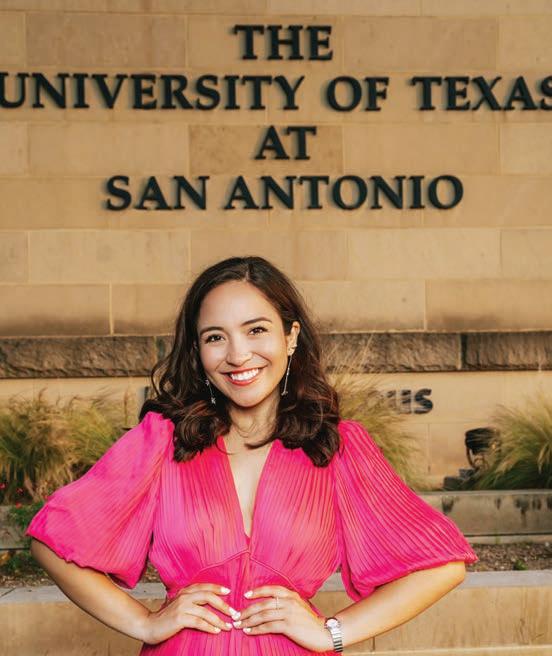
That study blossomed to include another UTSA student and a Tulane student as co-leads – and they were invited to present at the American Public Health Association Conference in Boston.
“Gabby’s and my work together on the FUTURE study has yielded important information about how undergraduate students on the health
track plan their careers along with their plans for parenthood,” said Sileo. “Through our work together, she has demonstrated leadership skills and intellectual curiosity, which I know will serve her well in medical school and beyond.”
Reynoso plans to continue this line of research throughout medical school. “This project is so important and it’s opened so many doors for me,” she said. “I’ve been able to present at so many places and I’m so grateful to all the mentors who have given me so many opportunities along the way.”
Her passion for medicine and healthcare prevails and UTSA has played a huge role in making those dreams a reality.
Ejike Chime ’24
Health Promotion and Behavioral Science
Ejike Chime was drawn to public health because of its flexibility and diversity. The breadth and depth of the courses were exactly what he was looking for to pursue a career in healthcare administration upon graduation.

Some of his favorite classes in the discipline included Effective Messaging in Public Health and Environmental Health And Safety.
“Even though Ejike's career goals are more focused on healthcare, he has embraced learning about public health and the work that is needed to help our communities,” said Erica Wallace, senior lecturer of public health. “We are proud to have him represent the Department of Public Health and UTSA.”
With the help of Professor Rhonda BeLue, Chime applied and was accepted to the Lewis Scholars' Imhotep Project, an 11-week summer internship program designed to increase the knowledge and skills of underrepresented minority students in biostatistics, epidemiology and occupational safety and health.
“UTSA has opened doors to my future career, especially because of professors who have offered me applications to internships,” Chime said. “I’ve been able to make really great connections.”
Ejike Chime
ENGAGE | 20
– Amanda Cerreto
Daryn Minst will work for the Baltimore Ravens, Roxana Moreno for the LA Rams and Octavio Lagunes will serve the Indianapolis Colts. The three students joined the athletic training apprenticeship program in the spring of 2022. The process to join the program includes time as an observation student, then upon acceptance into the kinesiology concentration an assignment under a certified athletic training preceptor from the UTSA Athletics program.
All three students served under the guidance of certified athletic trainers Nik Turner, Samuel Hinojosa, Brian Benitez and Justine Humphrey during the fall 2022 football season.
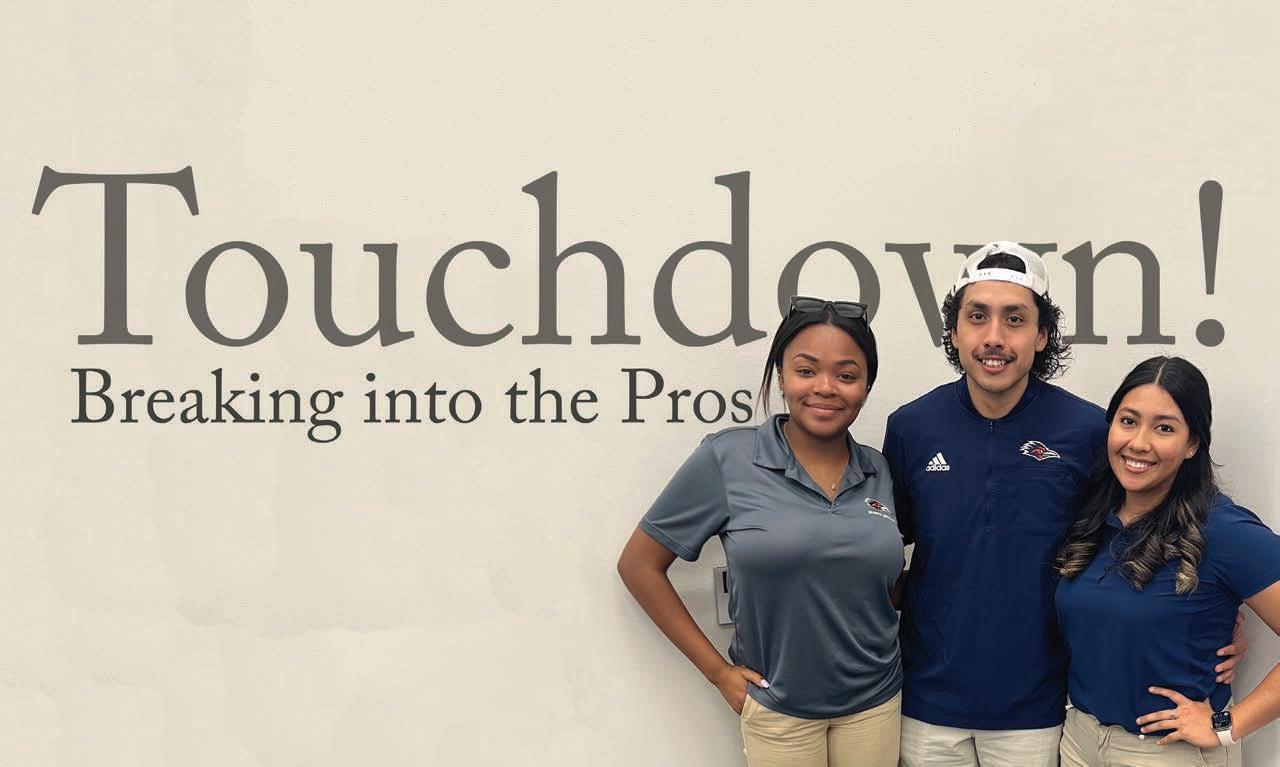
“The students showed up day after day proving they could endure trials that came with camp and season and shined through it all,” Turner said. “The NFL is an experience and opportunity that can set them up for a future in the profession.”
Minst, a senior from McKinney, Texas, was assigned to softball for the spring of 2023. Her Preceptor was licensed and certified athletic trainer Caitlynn Morris. Minst earned her EMT license in 2018 and has been able to use those skills to become exposed to multiple facets of the medical field. Her career goal is to work in the NFL after she graduates with her master’s in athletic training.
Moreno is a first-generation Latina student raised in Eagle Pass, Texas. She played multiple sports and treatment of injuries became something she wanted to learn more about. She was assigned to track for the spring of 2023 with licensed and certified athletic trainers Jayson Vincent and Kaitlin Boothe. Her career goal is to either work at a professional D1 school or the NFL.
“I am very excited to see athletic training at the professional level,” Moreno said. “I’m grateful to have this opportunity as it feels one step closer to my athletic training goals.”
Lagunes comes to UTSA as a first-generation Latino student from Mirando City, Texas. He played four years of football and had his fair share of injuries, leading him to spend quite a bit of time in his athletic training facility. That is what helped him determine that he wanted to become an athletic trainer at the professional or collegiate level. His spring 2023 assignment was with women’s soccer under licensed and certified athletic trainer Shelby Dale.
The UTSA athletic training apprenticeship program provides an experiential learning opportunity for kinesiology majors in the athletic training concentration. Students in the program gain hands-on clinical experience, mentorship, and adhere to the polies and procedures as laid out by the scope of practice in the Texas athletic training law regulated by the Texas Department of Licensing and Regulation. Students who complete an apprenticeship program are eligible to earn a Texas athletic training license upon completion of their undergraduate degree.
–Nydia Cabra
 Three students from the UTSA Kinesiology athletic training concentration have been selected as interns for the National Football League this summer.
Three students from the UTSA Kinesiology athletic training concentration have been selected as interns for the National Football League this summer.
21 | ENGAGE
Scan for more information about the UTSA athletic training concentration and apprenticeship
Under the helmet and in the classroom
The life of UTSA Quarterback Frank Harris
UTSA starting quarterback Frank Harris didn’t always want to be a football player. For most of his youth, in fact, he wanted to be a bull-rider.
Growing up in Converse, Texas, Harris was surrounded by horses and spent his time hunting and fishing. He loved going to the rodeo with his brother, outfitted with his cowboy boots, San Antonio Spurs belt buckle and cowboy hat – and he wanted to be down in the ring riding those bulls.
“My dad was on board with it,” Harris recalled. “He bought a little toy bull with springs on it and I would ride on it and jump off onto the couch like I was jumping off a bull.”
While he still holds a place in his heart for the country, and you can find him fishing on his breaks, Harris quickly realized that the rodeo life wasn’t for him.
“As I started getting exposed to sports, I quickly decided to change gears,” he said.
Thankfully for UTSA, Harris latched onto football and became dedicated to making it to a Division I program.
Even though UTSA was a half hour away from his hometown, it was a new world for Harris – far enough away from home to strike out on his own, but close enough to be back for holidays.
Harris spent his first two years redshirted and rehabbing an injury, leaving him unable to play. He took this time to fully explore courses and interests as an undergraduate. When he found an introduction to sociology class with Favor Campbell, he was hooked.
“I just fell in love with it,” Harris said. “Professor Favor Campbell taught us things applicable to real life and things we could use on an everyday basis.”
“Sociology is a discipline that covers so many challenging, real-world topics,” Campbell said. “I teach it in a way where I hope my students leave having learned how to embrace seeing things from different perspectives, even if they don’t necessarily agree with it. I really want them to become the best version of themselves, and Frank Harris is a wonderful example of this.”
By the time he was a redshirt sophomore, Harris’ degree was declared and he was ready to play –earning the starting quarterback job in late fall camp – only to land a season-ending injury four games in. With his never-quit mentality, however, he rehabbed and was determined to make it back on the field.

Harris was ready to give it his all, again, as a redshirt junior – despite the altered season due to the COVID-19, despite his past injuries, and despite the new lifestyle that quickly became our new normal. “No matter what is thrown at you, you have to be disciplined enough to do your work,” Harris said. “You have to leave practice and study, do your homework, and make sacrifices to make sure it all gets done.”
The “get it done” mentality has helped Harris lead his team to a slate of firsts – the program’s first top 25 rankings, conference championships in 2021 and 2022, division championship in 2021, and three consecutive bowl games from 2020-2022. Personally, Harris has won numerous awards,
ENGAGE | 22
including 2022 Conference USA Most Valuable Player, C-USA Championship Game MVP and Earl Campbell Tyler Rose Award finalist, and he holds more than 30 school records.
“Frank Harris is one of the most unique studentathletes I have ever coached in more than 30 years in the business,” said head coach Jeff Traylor “He epitomizes what you want in a quarterback. He’s a great leader who is loved and respected by his teammates, and he never gives up, no matter the situation we’re facing. He’s a talented and accomplished player who will go down in our history as one of the greatest to ever play at UTSA.”
Harris earned his B.A. in sociology in 2021 and enrolled in the Master of Public Administration program to continue his studies – and to continue playing football.
“Graduating with my degree was pretty special,” Harris said. “I’m the youngest of four graduating, and it was big for my family.”
Despite the demanding schedule of training, regular-season games, spring games, and more
training, Harris has remained a model student and is excelling in his master’s program.
“Frank is the definition of a student-athlete,” said Jeff Coyle, lecturer of Public Administration. “He rarely missed a class, always participated in the dialogue and used each of the assignments to further his understanding in the area of urban management that interested him most — public safety. He was as much a joy to have in my class as he is to watch on the field.”
While the line from sociology to public administration may not seem solid, Harris points out the connection between the two and how it can help him on and off the field.
“My undergraduate degree really put things into perspective for me,” he said. “To understand things like why certain areas have high crime rates, what drives people to do certain things, and how society is built.” With that understanding comes the ability to start to implement change – with a degree in public administration, Harris will learn how policies are written and ways to affect change with the reasoning behind it.
Although his time with UTSA is winding down, Harris has several highlights to look back on – and major goals to accomplish before graduation.

“Winning the conference championship – that’s what my goal was coming into the program,” he said. “Looking back on the last two seasons, it’s hard to explain all the hard work that we've been putting in, and all the obstacles that I had to jump over myself just to get to the point where I am now – it’s a wild experience.”
He won’t be fully content, though, until UTSA wins that first bowl game. After that, he’s ready to see where life – and football – takes him.
“I just go day by day,” Harris said. “I’m hoping to get married next year, and we’ll see – maybe I’ll still be playing football, or I’ll have a job lined up. It’s exciting for me to take the next step in my life.”
– Amanda Cerreto
23 | ENGAGE
Advancing human health

The College for Health, Community and Policy was developed as an interdisciplinary college with intentions for students to be able to study across its offered majors as well as majors across the entire university.
All of HCAP’s disciplines inform each other; you can’t examine public policy, for example, without considering public health, criminology and criminal justice, psychology, nutrition, sociology and more.
As a broad, all-encompassing field, public health touches all aspects of the majors and studies within HCAP. Public health relies heavily on medical fields such as epidemiology, clinical medicine and biostatistics. It also intersects with environmental fields such as health sciences and toxicology. Public health is closely tied to social and behavioral fields – psychology,
sociology and more – to help researchers better understand how social factors such as poverty and education can affect health outcomes. Public health also requires strong policy and advocacy skills, as it is crucial to be able to translate research findings into effective policies and communicate their importance to policymakers and the public.
HCAP alumni from every major discuss how their careers today touch public health – and illustrate how interconnected our college is.
ENGAGE
24
|
Mary Bollinger ’10 Research Health Scientist University of Arkansas for Medical Sciences Veterans Health Care Administration Doctor of Demography
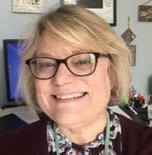

Tina Castellanos ’21
Maternal and Child Health Disparities Strategies Specialist Texas Department of State Health Services Master of Public Administration
Mary Bollinger
Mary Bollinger was introduced to the field of demography while pursuing her Master of Public Health. Bollinger’s interests laid primarily in epidemiology, but when she discovered how much of that overlaps with demography, she was hooked. Now, as a researcher at the Veterans’ Health Administration, she uses her demography training every single day.
“The VA is using the public health model to try to reduce the number of suicides among veterans,” Bollinger said. “I’m working with the Office of Mental Health and Suicide Prevention on a model of suicide risk that will help give them an idea of where suicide activity is high.”
With this data, the VA can go directly into these communities and figure out how best to intervene for at-risk veterans. Bollinger is also working on developing a survey for new veterans, as they are at higher risk for suicide in their first year post-service.
That data Bollinger works with is very much in the public health realm, but what she does with it is very demography related. “We’re very concerned about the ways that where we live influence who we are, the opportunities and resources available to us, and ultimately our health,” she said.

In addition, Bollinger is a CORE investigator in the Suicide Prevention Research Impact Network, a Veterans' Affairs (VA) research consortium, working to accelerate VA suicide prevention research by, among other things, identifying research priorities, maintaining up to date information on current research activities, and conducting periodic evidence reviews on clinical and non-clinical interventions as well as community-based interventions. “There are currently no evidence-based, community-based interventions for suicide prevention, which can be pretty frustrating when you know how important communities are to health,” she said.
Bollinger maintains she would not be as successful in this challenging work without her doctorate degree in demography.
“The skills you’ll build in this program are just not skills you get anywhere else,” she said. “For the longest time, I was the only demographer at the VA. There are now two of us – both from the UTSA Demography program. The research we do with the BA is critical to the health of veterans and UTSA gives you the skills you need to do that work.”
More important than the skills, however, are the connections Bollinger built through the program. “To this day, I still reach out to my demography advisors for help or guidance on certain things,” she said. “It makes you feel like you are part of a large, extended family.”
Tina Castellanos began her studies with an intent to focus on maternal health. With that in mind, public administration wasn’t at the top of her list until she emailed Jennifer Alexander, associate professor.
“We had a really great conversation and it made me feel so comfortable applying for the MPA,” Castellanos said. “We talked through how I could apply my passion for public health and maternal and child health in this discipline.”
Prior to entering and throughout her master’s degree studies, Castellanos owned The MILC Group, providing education and consultation services to families in San Antonio and the surrounding areas. For more than eight years she has been a community advocate for women’s health and lactation and has provided consulting services to nonprofit and private organizations in these areas. In total, she has been an IBCLC for 11 years and worked with families across the city for 23 years as a peer support contact.
As a nontraditional student returning to school while juggling a career and children, Castellanos felt some trepidation. However, that discomfort disappeared after the first class. “Nobody ever made me feel like the odd one out,” she said, “and they all valued my experience.”
She particularly connected with Kandyce Fernandez, assistant professor, and the two co-authored a published work with Bristol University Press based on Castellano’s capstone project.
After graduation, Castellanos applied for a position with the Texas Department of State Health Services. Although she seemingly lacked experience in the public health realm, she was offered the position and believes it is a true marriage of her passions.
As a Maternal and Child Health Strategies Specialist, her role covers 28 counties from the border to the coast. Her department helps to run rural health programming throughout those regions. Castellanos analyzes the data on the counties they serve to spot trends – teen pregnancy rates, smoking rates for pregnant women, infant mortality and more – and uses that data to develop programming targeted to the communities that need it most.
Castellanos also runs a CDC grant project in Calhoun County to analyze health disparities and develop programs to help address those gaps. Every day she finds more ways that the MPA program has given her skills for the job that she never would have dreamed she’d use.
“At UTSA, I was a graduate research assistant for Maria Veronica Elias, working on border policy,” she said. “I never thought it would be applicable to my work. But it truly helps me – so much of the community
Tina Castellanos
25 | ENGAGE
that we serve are immigrants, and seeing those gaps in care and learning cultural competence has absolutely made a difference in my work.”
Castellanos credits her career now and her skillset to UTSA, and encourages others – particularly nontraditional students – to take the leap and think outside the box.
“It’s almost as if this job was written for me,” Castellanos said. “So many things I learned in the MPA program I’m using daily here, and it’s incredibly impactful work.”
April DeMendonca ’18 ’23
Program Specialist
National Association for Latino Community Asset Builders
Bachelor of Arts in Criminology and Criminal Justice, Master of Science in Criminology and Criminal Justice
A self-professed crime junkie, it seemed only natural for April DeMendonca to pursue criminology and criminal justice. Born and raised in San Antonio, the second natural choice was to attend UTSA for her studies.
On the surface, it may not seem like a program specialist position would have such strong ties to public health, but the organization provides all the building blocks needed for a society to function more equitably.
“Affordable housing is public health,” DeMendonca said. “Advancing economic opportunities in historically marginalized communities leads to more security, lessening poverty and crime. Helping to balance out that economic injustice is a crucial part of public health.”
DeMendonca is able to travel in this role, enabling her to see the changes her organization is making firsthand. “For a little while, I felt stuck with my degree,” she admitted. “But then I remembered what I was learning every day in the classroom and how criminology and criminal justice is so much more than policing.”
Sierra Hunter ’19
Manager Endeavors
Bachelor of Science in Public Health
As a military brat, Sierra Hunter moved around a lot. When her father retired in San Antonio, she knew she wanted to stay close by and enrolled at UTSA. She knew she wanted to study public health, drawn to its community-based nature and the ability it gives to help people on a larger scale.

It was only after she began her studies that DeMendonca realized how broad the field of criminology and criminal justice was. It wasn’t limited to police work or flashy detective work on the crime shows. She quickly learned the intricacies of the field, including data collection, behavioral science and more.
April DeMendonca
She joined the discipline’s national honor society, Alpha Phi Sigma, and found more doors open to her – including studying abroad in Spain.
“It was the best experience I’ve ever had,” DeMendonca said. “I made so many lifelong connections, including the person who introduced me to my current career.”
After graduating with her bachelor’s degree, DeMendonca took a job as an investigator for Texas Health and Human Services. Her duties included interviewing children and adults with mental illness or intellectual or physical disabilities regarding potential abuse, neglect or exploitation.
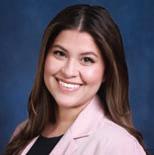
After nearly four years in the role, however, she felt she had reached a ceiling. She knew her work was important and effecting a positive change in public health daily, but needed a change.
Enter her connection from her study abroad experience in Spain, who had just the opportunity for her: a position as a small business program specialist for the National Association for Latino Community Asset Builders (NALCAB). In this position, April can support small businesses that serve nonprofits through grantmaking, technical assistance and training.
“NALCAB advances economic mobility in disadvantaged Latino communities,” DeMendonca said. “We ensure that money goes toward small business support, affordable housing, financial health education and more.
At UTSA, Hunter joined a group called the Health Nest Program. These peer educators provided weekly outreach on health education topics for their fellow students, with topics ranging from sunscreen usage, vaccines and more. “I absolutely loved my time in this program, and it allowed me to grow hard skills like public speaking, engaging various audiences and preparing materials – all things I do in my work at Endeavors,” she said.
Hunter serves as a program manager of Endeavor’s Zero Suicide initiatives. Her job functions revolve around creating, implementing and managing the initiative. She provides direct trainings to the staff at Endeavors as well as community partners, and builds out processes and procedures on what staff can do when they identify someone to be at risk of suicide.
“The functionality of this initiative – and my job – is really public healthrooted,” Hunter said. “There were several classes at UTSA that really taught the groundwork of how to create a program based on a public health issue, which is my exact day-to-day.”
While Hunter loves the health-driven focus of her job, she also enjoys the blend of many other disciplines that it entails. “We leverage the idea of marketing within public health messaging and awareness, and the daily work encompasses so many other disciplines,” she said.
Hunter works with people from a multitude of backgrounds and disciplines – sometimes she is the only one at the table with a public health background. “So much of the work public health graduates do is multidisciplinary,” Hunter said. “UTSA really built that foundation for me and taught me how to maneuver those conversations when we all come from different disciplines.”
Program
Sierra Hunter
ENGAGE | 26
The main goal of Endeavor’s initiative – besides bring the suicide rate to zero – is to shift the narrative surrounding suicide. “As a society, we think that suicide prevention should sit in a clinical setting,” Hunter said. “But that hasn’t been effective because numbers are still high. To shift the narrative and moving it into non-clinical settings reaches more individuals who can learn the information and dive into it, and make suicide prevention a community problem to solve, not a clinical one.”
Sam McCrary ’95
Co-Director, Methodist Sports Medicine
Bethpage Consulting Bachelor of Science in Kinesiology
Sam McCrary was introduced to the idea of athletic training in seventh grade and never looked back. As an athlete his entire life, a coach suggested the idea of athletic training to him, and it took hold. After beginning his collegiate career at Texas Tech, he had to move to San Antonio before graduation, leaving him with a decision to make – UTSA, or Texas State.
“Those were the only two athletic training programs in the area,” McCrary said, “and UTSA was the only one with an internship program. I drove down to meet with Jerry Greeson and then made the decision.”
He cites that decision as one of the best decisions he could have made for his career. “I made lifelong connections at UTSA,” McCrary said. “I run a company with my former classmate, and Jerry Greeson works with us now, too,” he said.
McCrary and his classmates left a legacy of their own at UTSA that has touched every single student who steps on campus. “I was part of a group that petitioned the school to institute a facility fee, and through those funds they were eventually able to build the Student Rec Center,” he said.
The Department of Campus Recreation, established in 1998, has grown from programming in the physical education Gym and Track Field to providing over 185,000 square feet of indoor space, 10 acres of artificial multi-purpose fields and a satellite facility at the downtown campus. The Rec Center employs 26 professional staff members and 300 part-time student employees.
After leaving UTSA, McCrary spent more than 20 years in secondary schools as an athletic trainer, administrator and eventually as an athletic director. Throughout this time, he had kept in contact with many of his classmates, including one who ended up reaching out to McCrary with a job offer.
“He needed an administrator to run the company,” McCrary said, “and I jumped into this and ran with it.”
McCrary oversees 15 full time athletic trainers and 115 PRN-aligned athletic trainers. The company provides coverage for schools that need dedicated athletic training services – from middle schools through colleges and universities and pro teams – and other organizations. Their large coverage area includes both rural and city areas. In the month of February alone, their staff covered 1,900 games.
“The athletic training profession has been in a time of change,” McCrary said. “UTSA has a great opportunity to continue to serve its local students by producing athletic trainers, because we’re at a point where there is exponential growth and a real need for this profession.”
Landon Molnar ’17 ’19 Business Analyst Natera Bachelor of Science in Public Health, Master of Science in Sociology
Landon Molnar was interested in public health for most of his life. As he went through school, he always had aspirations of becoming a physician. “As I got older, I started to think that the way I conceptualized health and the things I wanted to do in that field were rooted in engaging with people and their behaviors – kind of like disseminating information,” he said. “While physicians certainly do that, it seemed to me that I could apply my skills around the scientific research and communication side of things.”
That led him to pursue his undergraduate degree in public health. When it came time to pursue his graduate degree, however, he chose sociology –and it wasn’t as big of a leap as one might assume.
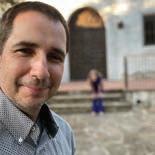
“Public health and sociology are really closely entwined,” Molnar said. “I wanted to study the why and how of collective health behavior and health knowledge, and sociology was the right path for that.”
The COVID-19 pandemic hit as Molnar was finishing up his graduate degree, and it further synergized the two fields as one in his mind.

“COVID was a perfect example of how sociology can be used in the health space,” he said. “The science behind vaccines and mask-wearing was good, but the social context wound up being awful. And that was where we needed social science researchers.”
After graduation. Molnar was hired as an emergency response task force member for Metro Health. He served the city as an epidemiologist, using test results and aggregate data to track COVID cases, make cluster maps and more. “It taught me how to see data from a top-down approach,” he said.
His time at UTSA prepared him for this community-embedded work in San Antonio. “UTSA is made up of the community it serves, and that is extremely important to public health and sociology,” he said. “Without it, you have no context for understanding the machinations behind anything that produces the problems and solutions that constitute your job.”
Shortly after beginning a doctoral degree, Molnar realized he sought greater perspective over the commercial side of public health, and transitioned to his current position at Natera. Natera is a global leader in cell-free DNA testing, dedicated to oncology, women’s health and organ health. Molnar’s role at work is once again to aggregate data and conduct analytics, but in this case for billing and revenue cycle management.
“It seems like a huge switch, but it is still all very connected,” Molnar said. “A lot of the drivers of health in this country are related to insurance
Landon Molnar
Sam McCrary
27 | ENGAGE
companies and cost of care, private decisions and profit motives. Understanding how people conceptualize their own care and what making these decisions feels like, from all sides, is valuable to me as a professional.”
Looking back on his time at UTSA and his career now, Molnar realized how valuable all of his experiences were to his professional and personal growth. “I struggled to find my footing for a few years at UTSA,” he admitted, “but San Antonio and UTSA gave me an opportunity to grow and flourish in a new environment with new types of support and challenges. By the time I finished my master’s degree, I was a very different person.”
Eric Ortiz '20
Clinical Dietitian - Lung Transplant University Health Master of Dietetic Studies
Eric Ortiz had always been curious about science and health, but didn’t see himself becoming a doctor. As he went through high school, and discovered the field of dietetics, he realized it was the perfect fit for him. It included a lot of science and pathophysiology, but also had a lot of interaction with people and a varying day-to-day.
Patricia Russell ’22
Health Science Specialist
VA Rocky Mountain Mental Illness Research
Education and Clinical Center (MIRECC) for Suicide Prevention, Denver, Colorado Doctor of Psychology

Prior to arriving to complete her doctorate, Patricia Russell spent 20 years as an educator in public schools. While it was a bit daunting to come back to school, as a lifelong learner and someone who had clear research interests in mind, it was fulfilling a lifelong goal for Russell. Her primary research interest was military health, so she immediately connected with Chair and Professor Sandra Morissette. Morissette is widely recognized for her work in military and veteran health, and the two connected immediately.
“Knowing that I could contribute and give back to the veterans who served our country, and knowing that UTSA had the only program in Texas that offered this field, it was the perfect fit,” she said.
Eric Ortiz
He enrolled in UTSA’s highly competitive nutrition and dietetics program and had his horizons broadened even more. “The program really opened my eyes to the different paths of dietetics,” Ortiz said. “Every clinical rotation was different and there were so many different paths we could take.”

Today, Ortiz works as a transplant dietitian with the lung team at University Health. His duties also encompass treatment for transplant donors and recipients on the kidney and liver teams.
“It’s the best of both worlds for me,” Ortiz said. “I get to fulfill my growth but also my curiosities.”
Ortiz’s day-to-day involves conducting nutritional assessments for both pre- and post-transplant lung patients. The assessments range from brand new transplant patients to those who are years out after a transplant.
“The other day I had a patient that even after nine years post-transplant, still wanted to talk to a dietitian, just to make sure that they're doing everything they need to do,” Ortiz said.
In addition to conducting assessments for lung patients, Ortiz works with kidney and liver transplant patients as well.
Ortiz credits his time at UTSA for preparing him to be the dietitian he is today, and advises anyone interested in this aspect of healthcare to keep pushing through any doubts. “I used to be a student in the university, but now I’m a student in the field,” he said. “There’s always growth. You’re not alone in the program, and you won’t be alone afterwards. There’s always room to grow and learn.”
Russell’s dissertation at UTSA expanded the study of trauma using the trauma film paradigm, which uses a distressing film to see how people react to a potentially traumatic situation. Her work aimed to validate a virtual methodology of the trauma film paradigm, and she is the first to use a virtual format. Russell is currently writing the results up in a manuscript and has received an award for her findings from the American Psychological Association.
Russell’s primary job function at the Rocky Mountain VA Medical Center is to work with community organizations and health care centers who serve veterans but are not specifically tied to the VA. Her department trains these organizations to create or bolster their suicide prevention practices in order to better serve their veteran population.
“We train them on suicide prevention best practices and military cultural competence, and on things like how to talk to veterans,” Russell said. “How do you get them to open up? How do you build that rapport with them?”
In addition to community outreach and training, Russell is working with her primary investigator on piloting intensive case management with veterans who are at risk for suicide. “We look at social determinants of health,” Russell explained, “and try to intervene on homelessness, food insecurity or factors that make everything else more difficult. In addition to connecting them with mental health treatment, we try to intervene by addressing psychosocial needs.”
Her research and work at UTSA is directly applicable to her work – not only is she analyzing data and building programs around it, but Russell also facilitates a learning collaborative, meeting with organizations once monthly to help with their programming. Apart from her daily programming, Russell continues to assist with clinical trials and research on veteran health to work from the most up-to-date data in an everchanging field.
Patricia Russell
ENGAGE | 28
“The outcomes of this research inform what is done in the clinical setting,” Russell said. “It’s difficult, yet extremely rewarding work – every day when I come to work, I’m motivated to do my part in saving veterans’ lives.”
 Morgan Zachmeyer ’22 Family Caregiver Specialist, Caregiver SOS Program Wellmed Charitable Foundation Master of Social Work
Morgan Zachmeyer ’22 Family Caregiver Specialist, Caregiver SOS Program Wellmed Charitable Foundation Master of Social Work
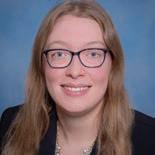
Morgan Zachmeyer had many plans for her future – and none of them included staying in her hometown of San Antonio. However, looking back on it, she is grateful things unfolded the way they did.
Zachmeyer was attending school in Baton Rouge, LA on a bowling scholarship with plans to graduate in 2020. She had a job lined up at DCFS, a contract signed, and a five-year plan at the ready – until COVID hit.
She returned home to finish her studies online, but because of travel restrictions and agency shutdowns, her plans for her career in LA were gone.
“I have such a supportive family and I knew I wanted to get my master’s at some point to be the social worker I really had imagined for myself,” Zachmeyer said. “So I applied with UTSA and it was one of the best decisions I ever could have made.”
“Every professor in the program brought something awesome to the table that I was really able to learn from,” Zachmeyer said. “The program was incredibly hard, but I loved that it challenged me. I was always guided in the right way.”
That challenge prepared her for her current job, she said – the business, the deadlines, the potential stress – while also giving her the practical skills she needed to succeed.
The Caregiver SOS Program at the Wellmed Charitable Foundation provides services at no cost for family members and friends providing care to an older loved one (60 years of age or older) with dementia or other chronic illnesses. As a Family Caregiver Specialist, Zachmeyer connects with caregivers and sets them up with education support groups, one on one coaching and more.
“We do a lot of evidence-based programs,” she said. “We’ll do a one-onone assessment and connect them with the programs that would work best for them. We also connect them with support groups to help navigate being a caregiver.” Zachmeyer administers all of those programs and services within four City of San Antonio senior centers.
While there may not be an obvious line from social work to public health, Zachmeyer maintains that she would not be able to do her job today without the foundations learned in the Master of Social Work program at UTSA. “This job is about 80% research,” she said, “and the program had us researching and learning critical thinking in every single project.”
“The Social Work program allowed us to learn how to implement processes and programming from national, to the community level, to the group, to the dyad and finally down to the individual,” Zachmeyer said, “and that is what I do every single day.”
– Amanda Cerreto
Morgan Zachmeyer
29 | ENGAGE
In Memoriam
Class Notes
1989
Joe Gonzales Master of Social Work recipient (posthumous)
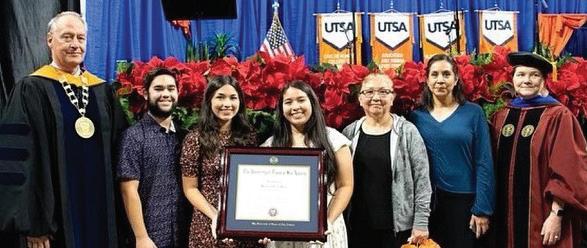
Joe Gonzales III, born on May 10, 1972, in Hondo, Texas died on June 28, 2022, at the age of 50. He is survived by children, Joe Gonzales IV, Camille Gonzales, Laela Gonzales; mother, Frances Sparks; brother, Seth Sparks; step-father, Tim Sparks; father, Joe Gonzales Jr., as well as numerous family members and friends.
Joe served in the US Marine Corps, and since his earliest contacts with our program he expressed his dedication to serving other veterans. He knew early on that he wanted to complete a field practicum at the VA, and he was on track to fulfill that plan this fall semester. He regularly mentioned his commitment to veterans and desire to instill hope in people feeling despair.
In memories that people involved with those who knew Joe have shared, common themes highlight Joe’s humor, wisdom, courage, pride in his children, enjoyment in “devil’s advocate” conversations, and his strong sense of determination and perseverance.
His wishes for his children were for them to be successful and good citizens. He had asked God to please give him time to see that they all graduated from high school. God gave him that time.
“Many of Joe's professors had experiences with him where he went out of his way to show kindness to us as individuals and encourage us in our work, especially when times were tough,” said Amy Chanmugam, chair of the Department of Social Work. “It was clear that he was very proud of his family, and he loved being a Dad and was especially proud of his children. He clearly wanted to help people, especially fellow veterans, and was accepted into a competitive internship at the VA for this fall semester. Joe said he wanted to instill hope in people who felt despair. We will miss Joe terribly, and share our condolences with your family. We are grateful we had the privilege of spending time with him in our program these last few years.”
Patricia Lenzi (Criminology and Criminal Justice) is an enrolled member of the St. Regis Mohawk Tribe, a member of the Wolf Clan. She serves as Chief Judge of the St. Regis Mohawk Appeals Court. Judge Lenzi is the Chief Judge of the Winnemucca Indian Colony, and Chief Judge of the Cedarville Rancheria Tribal Court, and a conflicts judge for the Yerington Paiute Tribe and the Duckwater Shoshone Tribe. Judge Lenzi has extensive courtroom experience as well as general legal experience. As an attorney, she has tried over 100 cases to jury verdict in state court. She has successfully represented tribes in tribal, state and federal civil litigation, administrative matters, and appeals. Judge Lenzi provides continuing education for professionals throughout the United States, and was an adjunct professor for Trial Practice at the University of California at Davis School of Law, King Hall. She has substantial experience as an instructor for professional colleagues throughout multiple states and agencies outside the U.S.
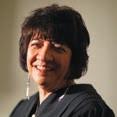
1994
Nicole Willis (Sociology) was recently named SchoolRelated Employee of the Year by Broward County Public Schools in South Florida. She serves as a career services advisor for business and economic development. Broward County has the 6th largest school district in the country.
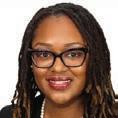
1996
Alfred Rapoza (Criminology and Criminal Justice) enjoyed his time at UTSA and remembers it fondly. Recently he attended a UTSA baseball game against the Islanders and had a blast. “When I attended UTSA we only had four buildings,” he recalled. “I remember graduating at the convocation building – I don’t recognize the campus now. It’s grown and beautiful.” He is proud to have received a formal education from UTSA.
ENGAGE | 30
Melissa Adame (Sociology) is part of the Executive Planning Committee for FEED SA 2023. FEED SA is an annual campaign that benefits the San Antonio Food Bank. Over the last two years alone, they have raised over a million meals for our San Antonio neighbors. Every year FEED SA provides a perfect opportunity for businesses, organizations, students, and families to volunteer and commit to fighting hunger. If you would like to learn more or gear up for 2024, please visit www.feedsa.org.
2004
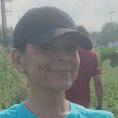
Manuel Jason Peña (Kinesiology) was a firstgeneration college graduate and is a 15-year veteran Teacher of Color, currently serving in Northside ISD. He is also living out a personal and professional dream goal: teaching in the Bicultural-Bilingual Studies department! Peña is nearing the end of his doctoral journey and will earn a Doctor of Educational Leadership and Administration from Gonzaga University. His wife of 28 years and all six of his children will be attending the commencement in Spokane, Washington on Saturday, May 13th. “The next phase of my journey is implementing cultural self-identity and self-decolonization systems and structures in professional development programs for Teachers of Color,” he said. “I am forever grateful to my UTSA alma mater for preparing me to be a global community change agent! Birds up!”
Mario Vela (Sociology, MA Sociology ’08), the assistant vice-provost for career-engaged learning and executive director of the University Career Center at UTSA, recently represented UTSA at the Global Career Services Summit on the programme committee in London.
2005
Geraldine J. Gonzalez (Criminology and Criminal Justice) celebrated six years of employment as a family law attorney at Legal Aid of NorthWest Texas this year.
2006
Alec Vasquez (Master of Public Administration) was selected to participate in the 7th cohort of the City of San Antonio Innovation Academy. The academy is focused on training city employees in Disruptive Lean Six Sigma yellow
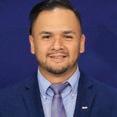
and green belts, user experience design, and data analysis.
2010
Julie Jackson (Criminology and Criminal Justice) commissioned into the Air Force as an Intelligence Officer upon graduation and served until August 2018. After being a military contractor for three years, she decided to completely change her career field and now works as an SaaS trainer (Software as a Service) for a Mergers and Acquisitions (M&A) company. She lives in Fort Worth, TX and has written one book, with plans to publish a second soon. The Myth of Adulting: Everyone's Just Winging It is currently available on Amazon, and Letters From Future Me will be available on Amazon and Barnes & Noble.
2011
Wayne Gonzales (Criminology and Criminal Justice) was recently awarded the 2023 Electronic Transaction Association “ETA” 40 under 40 honor. He currently serves on the Board of Directors for the Runners Rising Project, UTSA’s first NIL collective dedicated to providing financial support and professional opportunities to student-athletes with regard to marketing their own Name, Image, and Likeness (NIL). Gonzales is the Senior Vice President for Risk Management and Compliance at Usio, and the company has rung the closing bell for NASDAQ on three separate occasions. He is deeply involved in the UTSA community, and has spearheaded Usio’s sponsorship efforts for UTSA events including the Diploma Dash, Alumni Association Golf Scramble, Alumni Gala and more.
2012
Johnny Villarreal (Sociology) is on his 28th year of the Fiesta Commission San Antonio. He has retired from Southwest Airlines. “I loved attending UTSA,” he said. “It was a great school and environment.”
2013
Carlos de la Garza (Public Administration) has been passionately working in government and the nonprofit sector, focusing on alleviating homelessness and providing support to vulnerable populations. He has recently taken
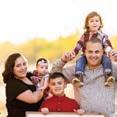
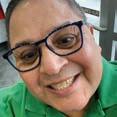
on the role of director of Miami for Volunteers of America Florida, a nationwide organization dedicated to helping homeless individuals and families. In this position, he has had the privilege of leading a team of compassionate and dedicated professionals who work tirelessly to make a difference in the community. “Together, we have implemented various programs and initiatives aimed at addressing the immediate needs of the homeless population while also working towards long-term solutions for housing and social integration,” he said. “I feel incredibly grateful to be part of an organization that is making a tangible impact on the lives of so many people in need. My education at HCAP has played an essential role in preparing me for this journey, and I look forward to continuing my work in this field.”
2015
Ali Reza Rajabzadeh (Master of Public Administration) is in Charge of Troy University's Texas Support Center. He manages the recruiting teams for both online and main campus students in 17 different states. Since assuming control of the Site, they have won Site of the Year five years in a row. In 2017, he was accepted into the Doctoral of Education Program at Northeastern University. In 2020, he welcomed his second son, Alexander. He completed his doctorate in the spring of 2021, and in the summer of 2022 he and his wife had their third child, Aaliyah!
2017
Joshua Gonzalez (M.S. Kinesiology) went on to receive his Ph.D. in integrative physiology from Michigan Technological University in 2021 and accepted a postdoctoral position at Oregon Health and Science University. His original research article, "Acute effects of electronic cigarettes on arterial pressure and peripheral sympathetic activity in young nonsmokers," has been awarded the AJP-Heart and Circulatory Physiology 2023 Best Research Article Award. This award will be announced at the 2023 American Physiology Summit. This was the first research article Gonzalez published with his UTSA advisor William Cooke. He was also recently awarded a small research grant from the Sleep Research Society Foundation to investigate how nicotine influences sleep and

1998
CLASS NOTES 31 | ENGAGE
circadian rhythms. “I really loved my time at UTSA, particularly working as a TA for the first-year experience course, Academic Inquiry and Scholarship.”
2018
Jesse Esparza (Public Health) recently began working for the City of San Antonio Metropolitan Health District in 2022. He works in the Communicable Disease Division as an HIV/STD Data Analyst specializing in program evaluation and improvement. After less than six months on the job, he was selected with a small group of individuals across all city departments to attend the highly respected internal leadership training program, “Innovation Academy.” In this program, he became Disruptive Lean Six Sigma (DLSS) Yellow Belt Certified and is continuing to gain valuable knowledge and skills to lead innovation. He is also going into his fifth season as an Assistant Volleyball Coach at Our Lady of the Lake University.
2019
Gabriel Alvarez (Criminology and Criminal Justice ) has recently completed his coursework for his PhD program at UCI in Criminology, Law and Society! This gives him more time for research! “Go Runners!!”

2020
Alan Mauney (Public Health) With constant reminders to never give up, support from family, friends and advisors, he can finally say that all the pre-requisite classes required for dental school are complete and he is one step closer to applying!
Elisa Negrete (Criminology and Criminal Justice, Psychology) recently became engaged to Carlos Prado, a fellow alum! They met at UTSA during their senior year and graduated together. “We are super excited and can’t wait to say ‘I do’ in April 2024!”

Bobbie Sheppard (Criminology and Criminal Justice) recently traveled with some friends to Zion National Park in Utah and had the most eye-opening, incredible experience. “If you have the opportunity to travel, I encourage you to take it,” she said. “Experiences are far more valuable than money will ever be.”
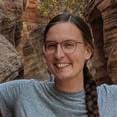
Christina Vetter (Public Health) spent many years as a health writer and communicator and recently landed her dream job as a full-time health editor. “I work for a company in D.C. that holds health communication contracts with the NIH, CDC, and other Federal health agencies,” she said. “Thanks UTSA for helping me get to where I am today.”
2021
Nathan Aguilan (Public Health) is coming up on a year of employment with Amazon, working as a Workplace Health and Safety Specialist in San Antonio. “I love my job and love working for one of the world’s top employers!”
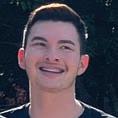
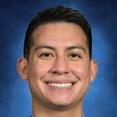
Anastasia Jones (Public Health, Sociology) continued her education at UT Health Science Center, School of Public Health San Antonio to pursue her MPH in Epidemiology and graduated in May 2023. She was also recently hired as an Epidemiologist 1 with the Texas Department of State Health Services.
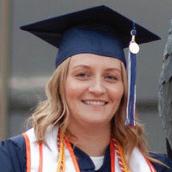

Maddy Palacios (Psychology) is currently attending graduate school at UTSA for clinical mental health counseling. She has recently accepted a year-long internship is excited to use the skills she learned in her collegiate career to help the community navigate their mental health needs. When the time is right, she would love to come back to work toward a PhD in counselor education and supervision. “I’m always going to represent and talk about my love for UTSA and the time I have spent here this far,” she said. “I will always be proud to be one of the thousands of alumni making a difference in the world! Go ‘Runners!”

Brittany Frankens (Public Health) spent her last semester at UTSA as an intern with University Health in the Community Initiatives & Population Health Department. Immediately upon graduation, she was offered a full-time position with UH as a Patient Navigator. She has also been accepted to graduate school at UTSA for the MS in Health, Community and Policy degree with a concentration in health data analytics.
Marcos Rodriguez (Criminology and Criminal Justice) recently accepted a job offer with the Travis County Juvenile Probation Department as a probation officer. He will be relocating back to Texas from California to start this new and exciting chapter in his life!

Nazish Sadruddin (Master of Public Administration) was an international student from Karachi, Pakistan. Last year, she joined a small company as a program evaluator and researcher. “I am still very optimistic to accomplish more towards my goals and dreams,” she said.
Anjali Shah (Kinesiology) is currently a medical assistant at Sienna Dermatology with plans to attend graduate school in the fall.

CLASS NOTES
2022
ENGAGE | 32
Dean's Excellence Circle
The HCAP Dean's Excellence Circle is a group of distinguished alumni and community leaders working together to further the mission of the College for Health, Community and Policy by engaging with students, faculty, and community members.
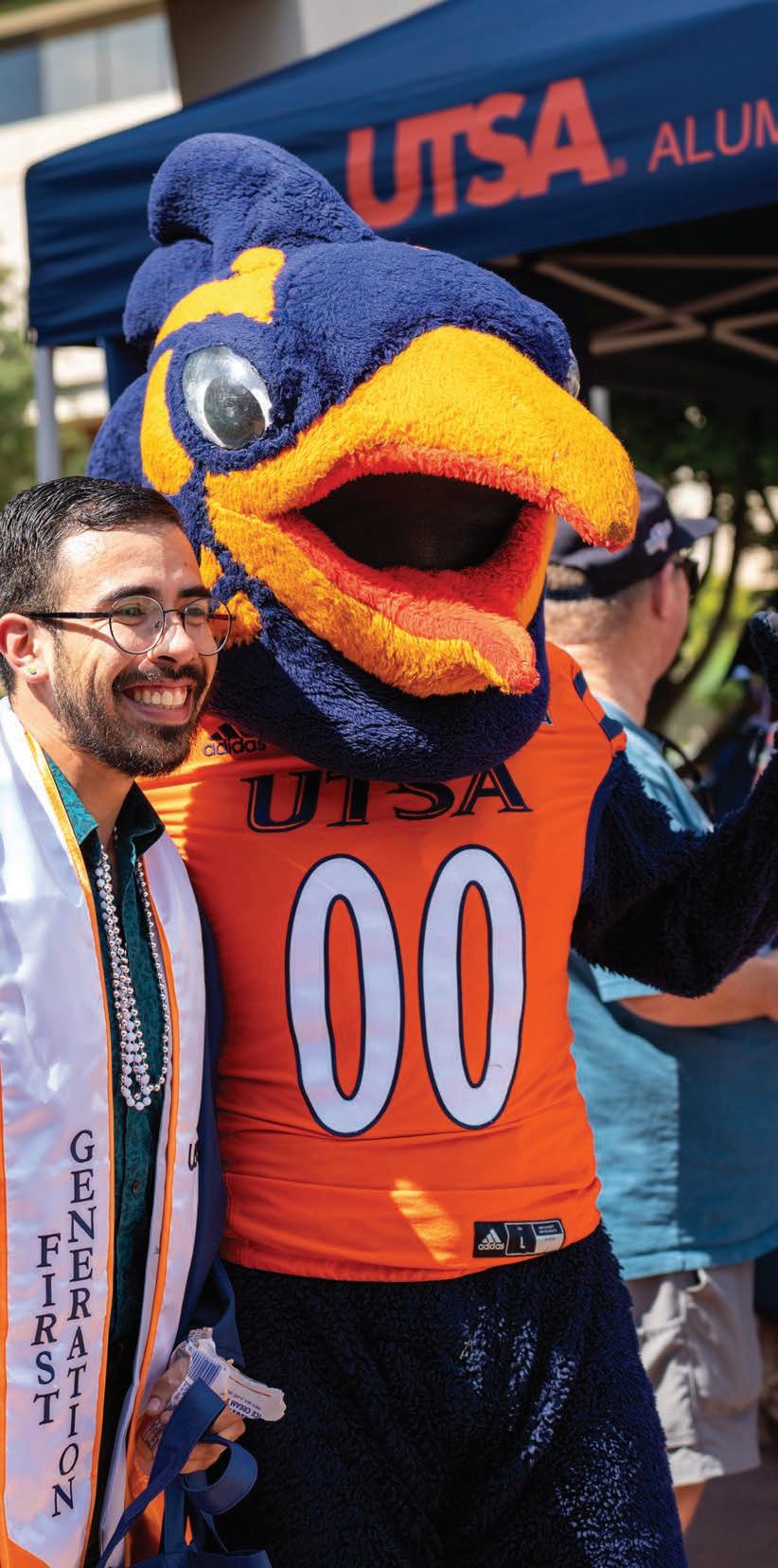
Co-Chairs
Joel Tabar ‘07, ‘10
Katie Vela ’14
Melissa Adame ’98
Liz Burt ‘19
Leti Cavazos ’12
Michael Cline ’10
Jeff Coyle ‘07
Lauren Ferrero
Andrea Figueroa ‘11
Geraldine Garcia ‘06
John Garza ‘14
Karina Garza ‘19
Erica Gonzalez ‘14
Ivalis Gonzalez ‘06
Ashley Harris ‘97
Denise Langabeer ‘90
Art Ortiz ‘97
Mariella Ozuna ‘17
Jennifer Pfeiffer ‘00
Clarissa Rodriguez ‘00
Jennifer Rower ‘13
Barbara Schafer ‘09
Daniel Shinaberry ‘16
Elsa Guerra Williams ‘82
Ross Willis ‘92
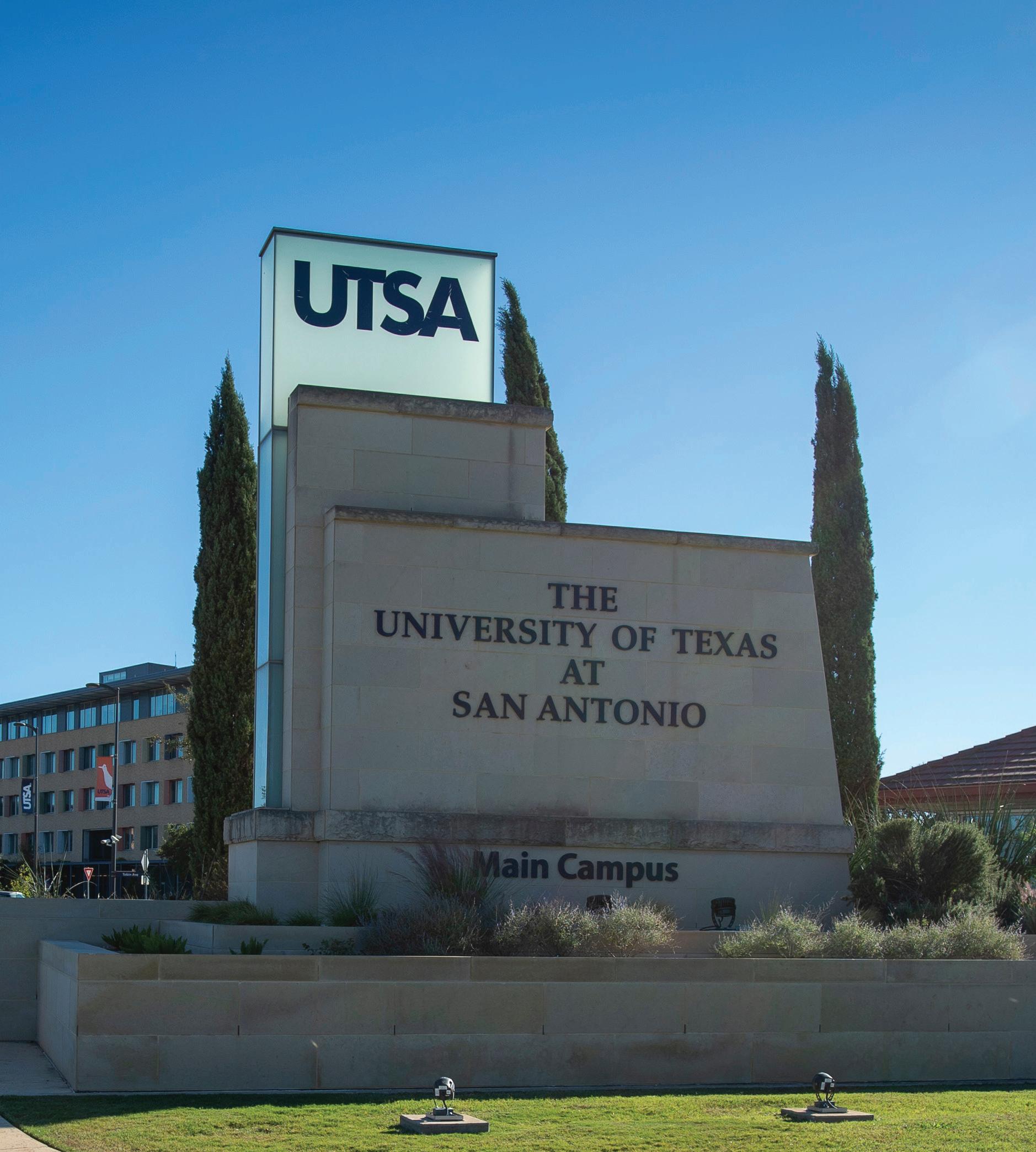 501 W. Cesar E. Chavez Blvd
501 W. Cesar E. Chavez Blvd
COLLABORATIONS
1 UTSA Circle San Antonio, TX










































 Three students from the UTSA Kinesiology athletic training concentration have been selected as interns for the National Football League this summer.
Three students from the UTSA Kinesiology athletic training concentration have been selected as interns for the National Football League this summer.












 Morgan Zachmeyer ’22 Family Caregiver Specialist, Caregiver SOS Program Wellmed Charitable Foundation Master of Social Work
Morgan Zachmeyer ’22 Family Caregiver Specialist, Caregiver SOS Program Wellmed Charitable Foundation Master of Social Work




















 501 W. Cesar E. Chavez Blvd
501 W. Cesar E. Chavez Blvd